Reports
2021 ↓↑
DCP FOUR YEAR REVIEW
A few stories from the field
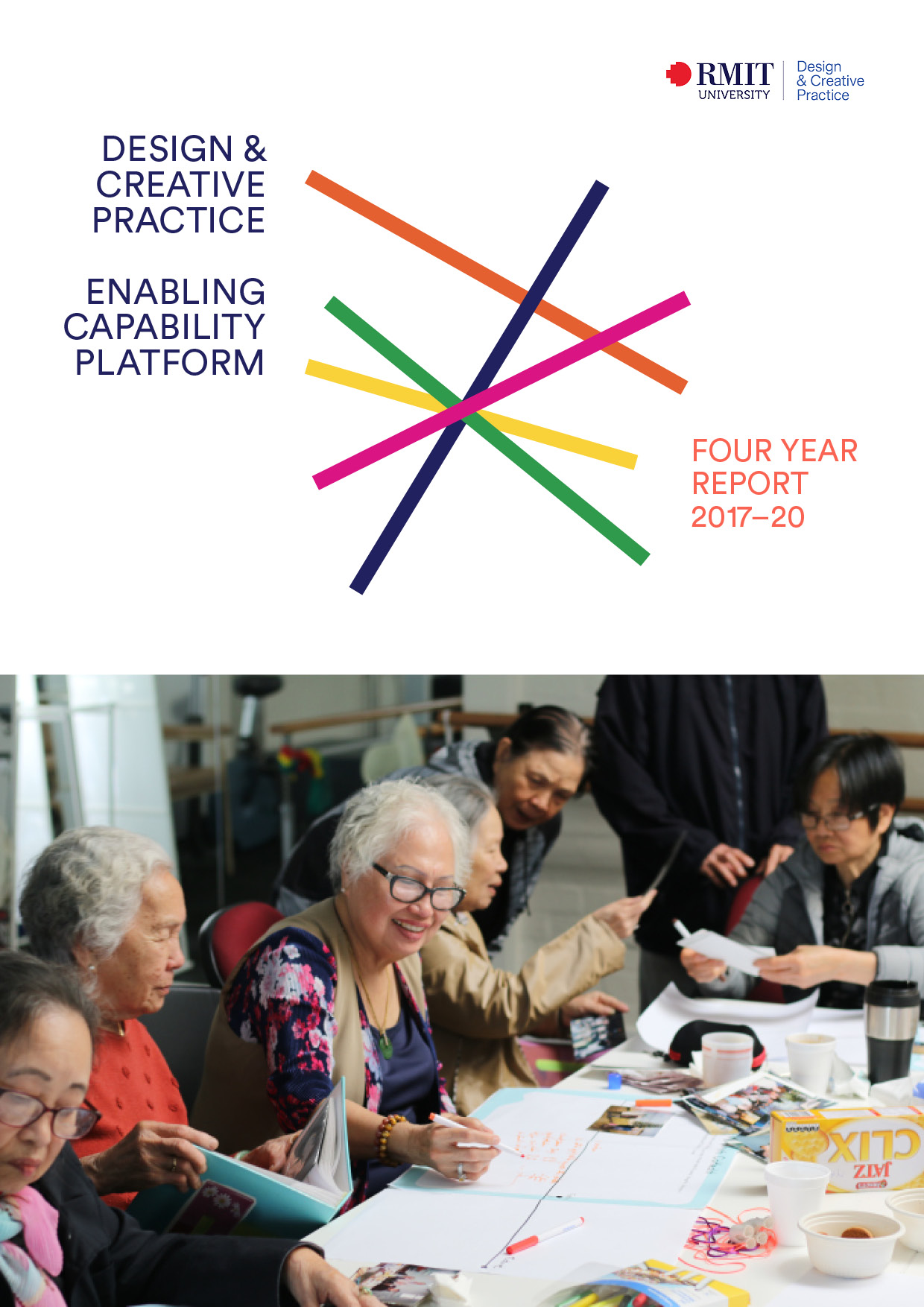
This report reflects on the first four years (2017 – 2020) of the DCP ECP.
The ECPs have facilitated and codesigned cultural change around engagement and impact. This includes:
— Facilitating and curating cultural change around doing impactful and collaborative research and research translation
— Fostering interdisciplinary collaboration
— Enabling researchers with diverse expertise, experiences, and similar interests to collaborate through agile vehicles (networks)
— Supporting early career researchers (ECRs) and higher degree by research (HDR) students to work within different contexts, disciplines, industry engagement.
If you would like to get involved with this project, fill out the form below or reach out to project leaders via the contact info provided alongside each bio.
People
Larissa Hjorth
Distinguished Professor and Director, Design and Creative Practice
School: Enabling Capability Platforms
Larissa Hjorth is a digital ethnographer, artist, Distinguished Professor and director of the Design & Creative Practice ECP platform at RMIT University. With Professor Heather Horst, she co-founded the Digital Ethnography Research Centre (DERC). Previously, Hjorth was Deputy Dean, Research & Innovation, in the School of Media & Communication (2013−2016). Hjorth served on the inaugural Australian Research Council (ARC) Engagement & Impact Pilot study assessment panel for humanities and creative practice.
Hjorth studies the socio-cultural dimensions of mobile media and play practices in the Asia-Pacific region with an emphasis on interdisciplinary, collaborative and cross-cultural approaches. She has published a dozen co-authored books, edited over a dozen Handbooks/Companions and has over 40 journal articles.
More recently, Hjorth’s work has become concerned with how we can bring creative, social and design solutions to the growing ageing populations and, in turn, how we might consider scenarios of what it means to die well. She is also studying how our “more-than-human” companions can teach us about new media in everyday life. Hjorth’s last book, Haunting Hands (Oxford Uni Press) looked at how mobile media is being deployed in situations of grief and trauma, her previous book explored how art practice can teach us new acumen into the climate change debate.
Hjorth’s books include Haunting Hands (with Cumiskey 2017), Screen Ecologies (with Pink, Sharp & Williams 2016), Digital Ethnography (Pink et al. 2016) Mobile Media in the Asia-Pacific (2009), Games & Gaming (2010), Online@AsiaPacific (with Arnold 2013), Understanding Social Media (with Hinton 2013), and Gaming in Locative, Social and Mobile Media (with Richardson 2014).
ECP Networks Summary: A Snapshot
August 2021
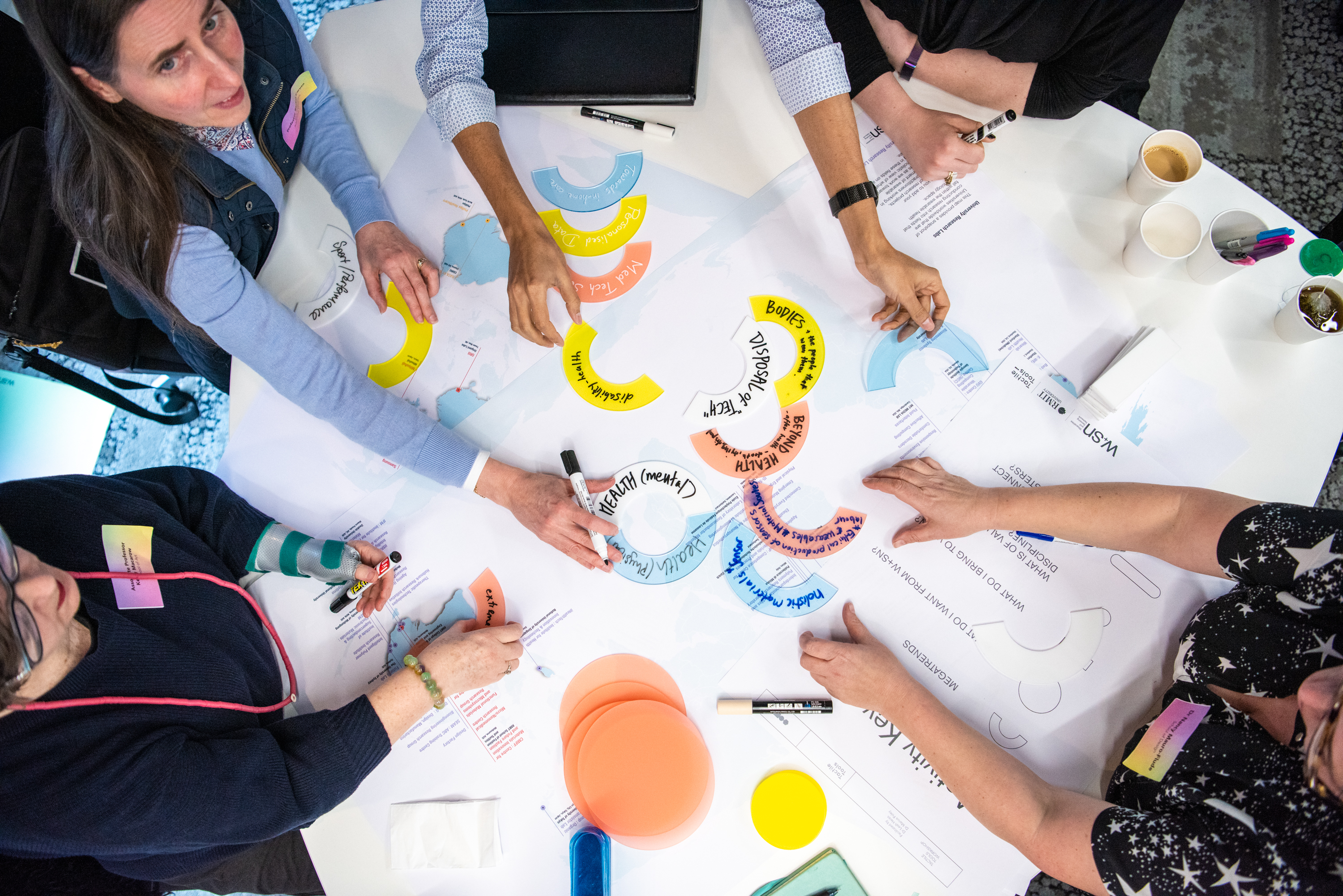
The networks encapsulate the spirit of the ECPs — demonstrating how the ECPs support building sustainable interdisciplinary collaboration (internal and external) for impactful research.
The networks’ impact expands beyond more than just traditional outputs (grants, articles) to ongoing collaboration with aligned partners. It is about creative and innovative research translation. Many of the networks are run by early career researchers (ECR) and foster collaboration not only across disciplines but career trajectories. We have networks at different scale and depth in response to existing and future orientated real-world problems.
The following 5 page summary report outlines the ECP Network ecosystem, highlighting a series of networks including:
— Bioinformatics Network
— Wearables and Sensing Network
— Australian Maritime Logistics Research Network
— Health, Arts Social sciences and Humanities Network
— Theoretical and Computational Modelling Network
— Space and Spatial Capability Cluster @RMIT
If you would like to get involved with this project, fill out the form below or reach out to project leaders via the contact info provided alongside each bio.
Co-designing Ageing Futures: A Critical Policy Brief
February 2021
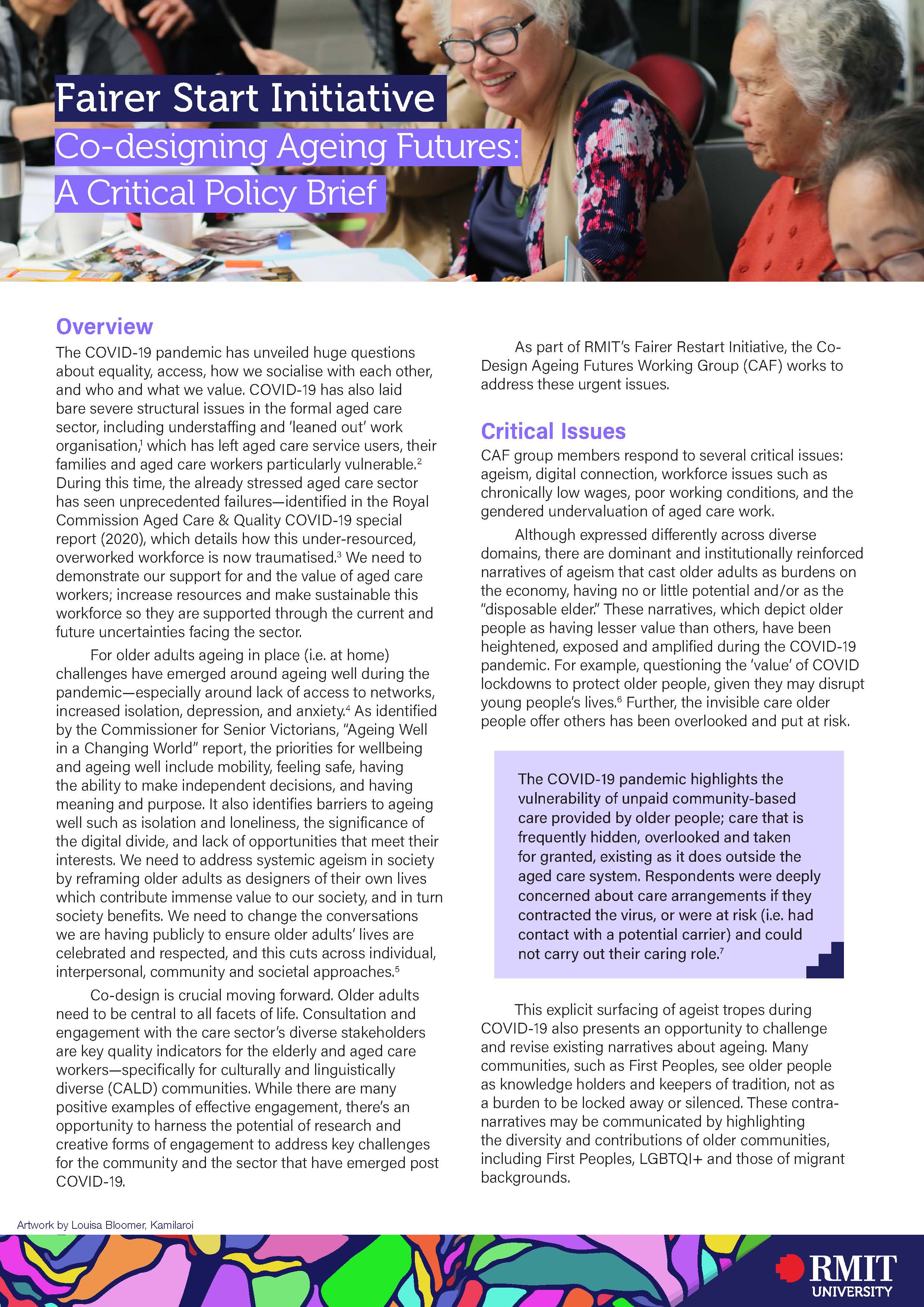
Summary
The COVID-19 pandemic has unveiled huge questions about equality, access, how we socialise with each other, and who and what we value. COVID-19 has also laid bare severe structural issues in the formal aged care sector, including understaffing and ‘leaned out’ work organisation, which has left aged care service users, their families and aged care workers particularly vulnerable. For older adults ageing in place (i.e. at home) challenges have emerged around ageing well during the pandemic — especially around lack of access to networks, increased isolation, depression, and anxiety.
Co-design is crucial moving forward. Older adults need to be central to all facets of life. Consultation and engagement with the care sector’s diverse stakeholders are key quality indicators for the elderly and aged care workers — specifically for culturally and linguistically diverse (CALD) communities.
While there are many positive examples of effective engagement, there’s an opportunity to harness the potential of research and creative forms of engagement to address key challenges for the community and the sector that have emerged post COVID-19. As part of RMIT’s Fairer Restart Initiative, the Co-Design Ageing Futures Working Group (CAF) works to address these urgent issues.
This Policy Brief outlines the critical issues in this area, creative approaches to research in ageing and aged care and maps RMIT’s capabilities and expertise to provide unique approaches to understanding the challenges faced by ageing populations. The future of ageing gets recalibrated as celebration and resilience.
If you would like to get involved with this project, fill out the form below or reach out to project leaders via the contact info provided alongside each bio.
People
Larissa Hjorth
Distinguished Professor and Director, Design and Creative Practice
School: Enabling Capability Platforms
Larissa Hjorth is a digital ethnographer, artist, Distinguished Professor and director of the Design & Creative Practice ECP platform at RMIT University. With Professor Heather Horst, she co-founded the Digital Ethnography Research Centre (DERC). Previously, Hjorth was Deputy Dean, Research & Innovation, in the School of Media & Communication (2013−2016). Hjorth served on the inaugural Australian Research Council (ARC) Engagement & Impact Pilot study assessment panel for humanities and creative practice.
Hjorth studies the socio-cultural dimensions of mobile media and play practices in the Asia-Pacific region with an emphasis on interdisciplinary, collaborative and cross-cultural approaches. She has published a dozen co-authored books, edited over a dozen Handbooks/Companions and has over 40 journal articles.
More recently, Hjorth’s work has become concerned with how we can bring creative, social and design solutions to the growing ageing populations and, in turn, how we might consider scenarios of what it means to die well. She is also studying how our “more-than-human” companions can teach us about new media in everyday life. Hjorth’s last book, Haunting Hands (Oxford Uni Press) looked at how mobile media is being deployed in situations of grief and trauma, her previous book explored how art practice can teach us new acumen into the climate change debate.
Hjorth’s books include Haunting Hands (with Cumiskey 2017), Screen Ecologies (with Pink, Sharp & Williams 2016), Digital Ethnography (Pink et al. 2016) Mobile Media in the Asia-Pacific (2009), Games & Gaming (2010), Online@AsiaPacific (with Arnold 2013), Understanding Social Media (with Hinton 2013), and Gaming in Locative, Social and Mobile Media (with Richardson 2014).
Renata Kokanovic
Convener, The HEALTH Network; Professor
School: Global, Urban & Social Studies
Professor Renata Kokanovic’s works at the intersections of health, society and medicine, with a particular focus on interdisciplinary mental health research.She combines empirical research with interdisciplinary theoretical and methodological scholarship while collaborating with industry partners and health care users to facilitate greater understanding of lived experiences of health and illness.
She co-founded Healthtalk Australia, a digital repository of health and illness narrative accounts designed to support people experiencing ill health, and inform health and social care delivery and policy.
Ruth De Souza
VC Research Fellow
School: School of Art
Dr Ruth De Souza (FACN) is a Vice-Chancellor’s Fellow at RMIT, based in the School of Art and DCP Research Platform. She is a nurse, academic and a community-engaged researcher in gender, race, health and digital technologies. Ruth’s Fellowship will engage health professionals in finding new ways to understand, co-design and implement sustainable cultural safety initiatives in a range of health contexts in response to health inequities.
Prior to moving to Australia in 2013, Ruth worked at AUT University where she taught in the School of Nursing, led the Bachelor of Health Promotion, and was a Senior Research Fellow at the Centre for Asian and Migrant Health Research. Since her arrival in Australia, Ruth has undertaken a wide range of roles, including leading an undergraduate nursing program at Monash University’s Berwick campus; spearheading a unique community-engaged joint research appointment with North Richmond Community Health exploring how wearables and other digital technologies are perceived by people from culturally and linguistically different backgrounds and co-ordinating an interdisciplinary Data Systems and Society Research Network across the University of Melbourne. Ruth has also investigated the applicability of cultural safety in Australia, working closely with The Congress of Aboriginal and Torres Strait Islander Nurses and Midwives (CATSINaM), presenting at their National Professional Development Conferences and delivering training on cultural safety. She has also undertaken a two-year cultural safety project with cohealth (a not-for-profit community health organisation) and Our Watch who work for the primary prevention of violence against women and their children.
Sara Charlesworth
Distinguished Professor
School: Management
Sara Charlesworth is Professor of Work, Gender & Regulation and Deputy Head of School, (Research & Innovation) in the School of Management. She is an executive member of the Centre for People, Organisation & Work in the College of Business. Sara has published and presented widely in a wide range of academic, policy and community fora and has been involved in a number of key gender equality policy reviews and debates. She was a panel member on the 2012 ACTU Independent Inquiry into Insecure Work, and an advisor to the Australian Human Rights Commission on their 2014 Pregnancy and Return to Work National Review and 2018 National Sexual Harassment Prevalence Survey.
In 2017 Sara was appointed to the Equal Workplaces Advisory Council, a founding reform of the Victorian government’s Gender Equality Strategy. She is currently a member of the Victoria Police VEOHRC Review Academic Governance Board, on the Steering Group of the Migrant Workers Rights Campaign and co-convenor of the Work+Family Policy Roundtable. Sara is a Fellow of the Future Social Services Institute and is on the editorial board of the Journal of Industrial Relations.
Sara’s research interests centre on gender inequality in employment at the labour market, industry and organisational levels. She has undertaken a number of Australian Research Council-funded projects. Much of her recent research has focused on paid care work. Together with A/Prof Deb King (Flinders), she completed a large three year Department of Health-funded project, ‘Quality Jobs and Quality Care: Improving work practices to deliver quality aged care jobs & aged care services for older Australians’, in partnership with Brightwater Care, HammondCare, Helping Hand and United Voice.
A Fairer Start: Vulnerable Work in Victoria
June 2021

Macdonald, F., Marshall, S., & Coombs, G.
Summary
The COVID-19 pandemic has exacerbated existing vulnerabilities of insecure workers in Australia. Insecure work has been a driver of COVID-19 transmission, revealing the prevalence of vulnerable workers and its society-wide flow-on effects. As a result various government initiatives and programs were introduced to address insecure work. But have these legal changes been making a difference to these workers? If they have not been reaching workers, then what are the blockers and barriers and how can they be overcome to foster more sustainable and inclusive work?
This report draws on the Roundtable on Sustainable and Inclusive Work for Vulnerable Workers on 3 December 2020 held by the RMIT University Fairer Start initiative and related literature. It addresses the nature of vulnerable work during the pandemic and highlights some existing services for fair and sustainable work in the Australia. It concludes by making recommendations to improve the lives of vulnerable workers and reduce insecurity.
During 2021, the Fairer Start Restart Working Group on Sustainable and Inclusive Work will build on this work to scope the broader range of issues and potential responses.
Suggested Citation
Macdonald, F., Marshall, S., & Coombs, G. (2021). Report on Vulnerable Work in Victoria. Melbourne: RMIT University.
If you would like to get involved with this project, fill out the form below or reach out to project leaders via the contact info provided alongside each bio.
People
Fiona Macdonald
VC Fellow
School: Business
Dr Fiona Macdonald is a Vice-Chancellor’s Senior Research Fellow in the School of Management. Fiona’s research focuses on three interconnected themes: the changing nature of work and employment relationships; regulating for decent work and gender equality; and the political economy of work. The empirical focus of Fiona’s current research on the social care workforce also brings in her long-standing interest in social policy and welfare systems.
In 2016 Fiona was awarded an Australian Research Council Discovery Early Career Researcher Award to examine the workforce challenges of Australia’s new National Disability Insurance Scheme (NDIS). Her research has strong policy relevance and she works closely with industry as well as with national and international networks of employment and care scholars. In 2017 she received the RMIT Vice-Chancellor’s Award for Research impact – Early Career Researcher. Fiona is a member of the Editorial Advisory Board of the recently established International Journal of Care and Caring.
Gretchen Coombs
Post Doctoral Research Fellow
School: Design and Creative Practice
Gretchen Coombs is a Post Doctoral Research Fellow in the Design & Creative Practice Enabling Capability Platform at RMIT. She researches socially engaged art practices in the US, the UK and Australia, with a particular focus on how they are practiced in urban contexts. She’s a core member of the Cultural Value and Impact Network (CVIN) and contributes to Creative Care in the School of Art. Gretchen has a PhD in social and cultural anthropology and a MA in visual criticism: her writing uses a combination of ethnographic methods and visual analysis. She is a co-author of Creative Practice Ethnographies (Rowan & Littlefield 2019) and her monograph, The Lure of the Social: Encounters with Contemporary Artists (Intellect 2021 ) is an experimental ethnography about contemporary artists working at the intersection of art, aesthetics, and politics.
Shelley Marshall
VC Fellow
School: Business and Law
Shelley is the Director of the Business and Human Rights Centre at RMIT University, Melbourne, Australia.
Shelley has undertaken empirical research on these topics in diverse countries, including Bulgaria, India, Indonesia, Australia and Cambodia, and has published widely based on her findings. Her high standing as a scholar has been recognised through the award a number of large multi-country grants, and she has undertaken collaborations with scholars from Cambridge University, Harvard University, Melbourne University and RMIT. Dr Marshall’s long term partnerships with the technical arm of the International Labour Organisation, Oxfam Australia and CORE UK have enabled her to produce research of a highly applied nature, which has had a strong policy influence and provided meaningful lessons for business and other relevant organisations. Likewise, Shelley’s leadership on the Steering Committee of the Australian Corporate Accountability Network has provided opportunities to influence Business and Human Rights policy in Australia.
Dr Marshall holds a Bachelors of Arts with a double major in Social Theory and Political Science and a Bachelor of Law from the University of Melbourne. She studied a Masters of Science in Development Studies at the London School of Economics and Political Science, where the focus was on economic policy. In 2015, she was awarded a Doctor of Philosophy in Regulation Justice and Diplomacy which she undertook at the RegNet School of Regulation and Global Governance, Australian National University under the supervision of Peter Drahos, Valerie Braithwaite and John Braitwaite. Dr Marshall is a Vice Chancellor’s Senior Research Fellow at RMIT University and an Australian Research Council DECRA Research Fellow.
ACCAN U3A Report: Reducing perceived risk & promoting digital inclusion for older Australians
August 2021
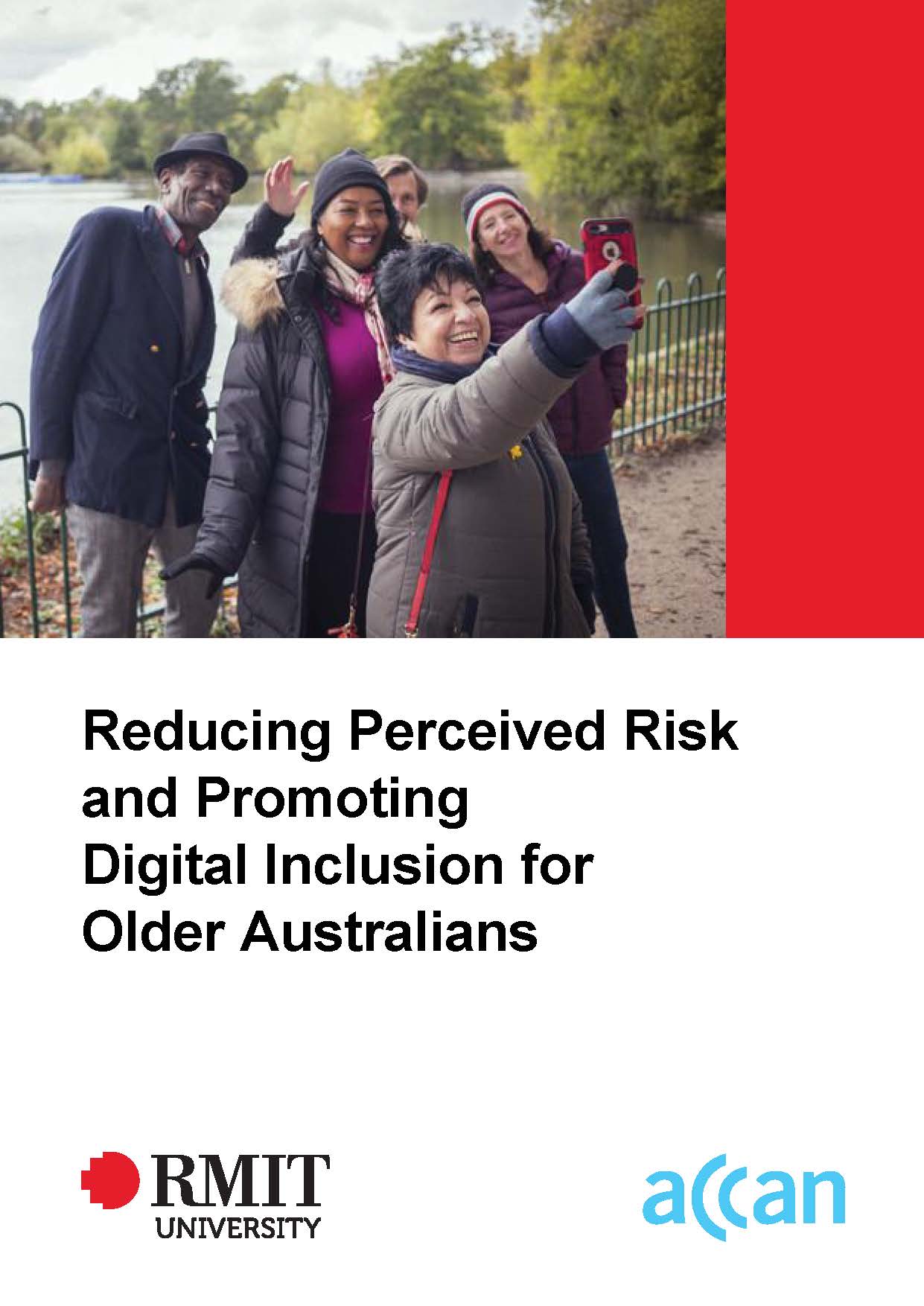
Bernardo Figueiredo, Torgeir Aleti, Mike Reid, Diane Martin, Larissa Hjorth, Mark Buschgens, Jozica Kutin, Jacob Sheahan.
Summary
This report describes the outcomes of stage one of the project, Explore and Quantify. This includes an analysis of 22 exploratory interviews resulting in 22 video vignettes of older adults’ information and communication technology (ICT) risk perceptions (March 2021), and findings from a survey of approximately 400 members from the University of the Third Age (U3A).
The focus of this research is to understand how older adults perceive risk associated with ICT usage and ownership.
Suggested Citation
Figueiredo, B., Aleti, T., Reid, M., Martin, D., Hjorth, L., Buschgens, M., Kutin, J., & Sheahan, J. (2021). Reducing perceived risk & promoting digital inclusion for older Australians. Melbourne: RMIT University.
If you would like to get involved with this project, fill out the form below or reach out to project leaders via the contact info provided alongside each bio.
DCP Director's Reflection
July 2021
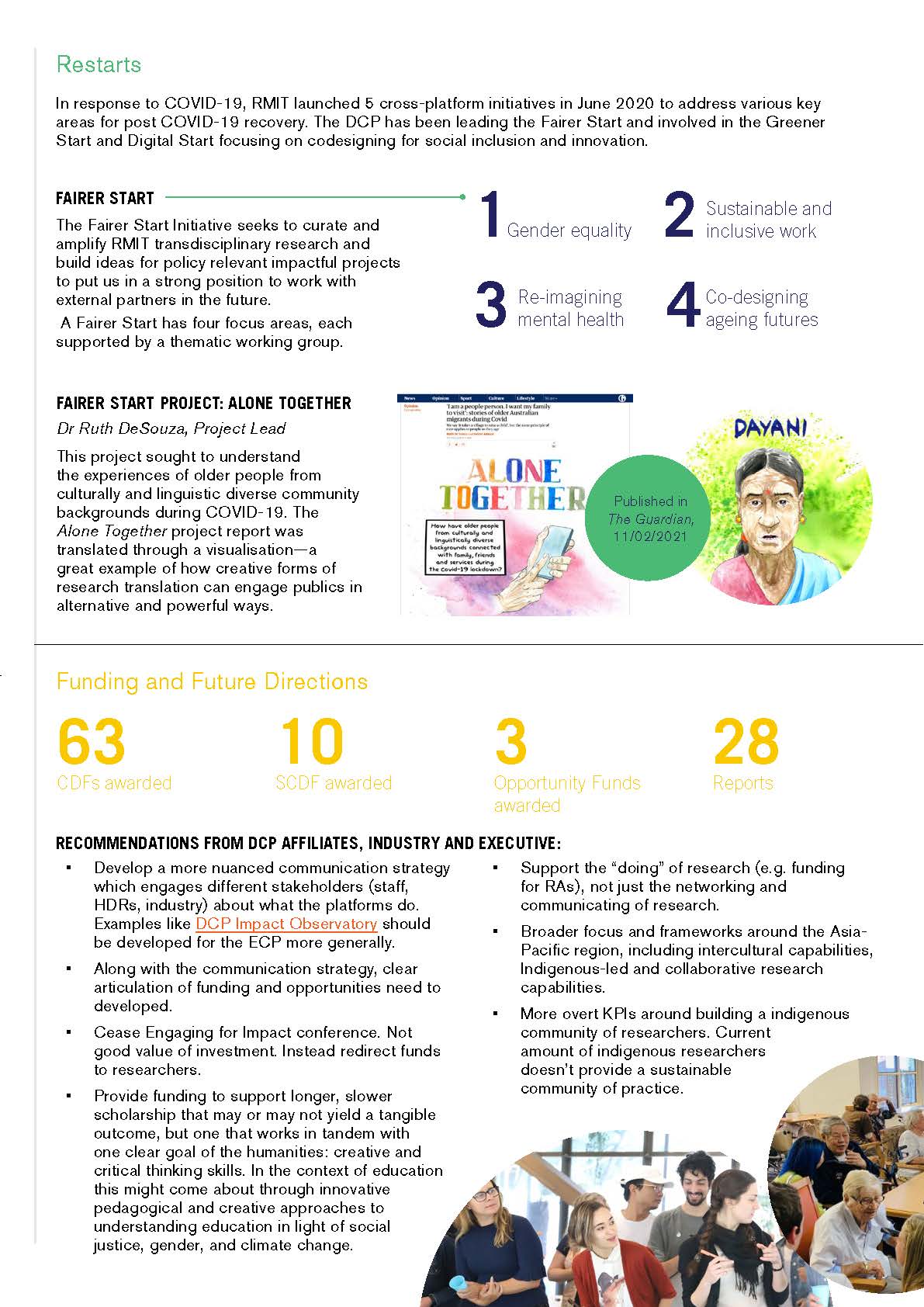
This five page Reflection document briefly describes the DCP ECP journey, progress to date and highlights from the last four years (2017−2020), how the DCP ECP has made a difference and also offers some thoughts about future directions.
If you would like to get involved with this project, fill out the form below or reach out to project leaders via the contact info provided alongside each bio.
People
Larissa Hjorth
Distinguished Professor and Director, Design and Creative Practice
School: Enabling Capability Platforms
Larissa Hjorth is a digital ethnographer, artist, Distinguished Professor and director of the Design & Creative Practice ECP platform at RMIT University. With Professor Heather Horst, she co-founded the Digital Ethnography Research Centre (DERC). Previously, Hjorth was Deputy Dean, Research & Innovation, in the School of Media & Communication (2013−2016). Hjorth served on the inaugural Australian Research Council (ARC) Engagement & Impact Pilot study assessment panel for humanities and creative practice.
Hjorth studies the socio-cultural dimensions of mobile media and play practices in the Asia-Pacific region with an emphasis on interdisciplinary, collaborative and cross-cultural approaches. She has published a dozen co-authored books, edited over a dozen Handbooks/Companions and has over 40 journal articles.
More recently, Hjorth’s work has become concerned with how we can bring creative, social and design solutions to the growing ageing populations and, in turn, how we might consider scenarios of what it means to die well. She is also studying how our “more-than-human” companions can teach us about new media in everyday life. Hjorth’s last book, Haunting Hands (Oxford Uni Press) looked at how mobile media is being deployed in situations of grief and trauma, her previous book explored how art practice can teach us new acumen into the climate change debate.
Hjorth’s books include Haunting Hands (with Cumiskey 2017), Screen Ecologies (with Pink, Sharp & Williams 2016), Digital Ethnography (Pink et al. 2016) Mobile Media in the Asia-Pacific (2009), Games & Gaming (2010), Online@AsiaPacific (with Arnold 2013), Understanding Social Media (with Hinton 2013), and Gaming in Locative, Social and Mobile Media (with Richardson 2014).
COVID-19 Practices and Perceptions in Australia (2020-2021)
December 2021
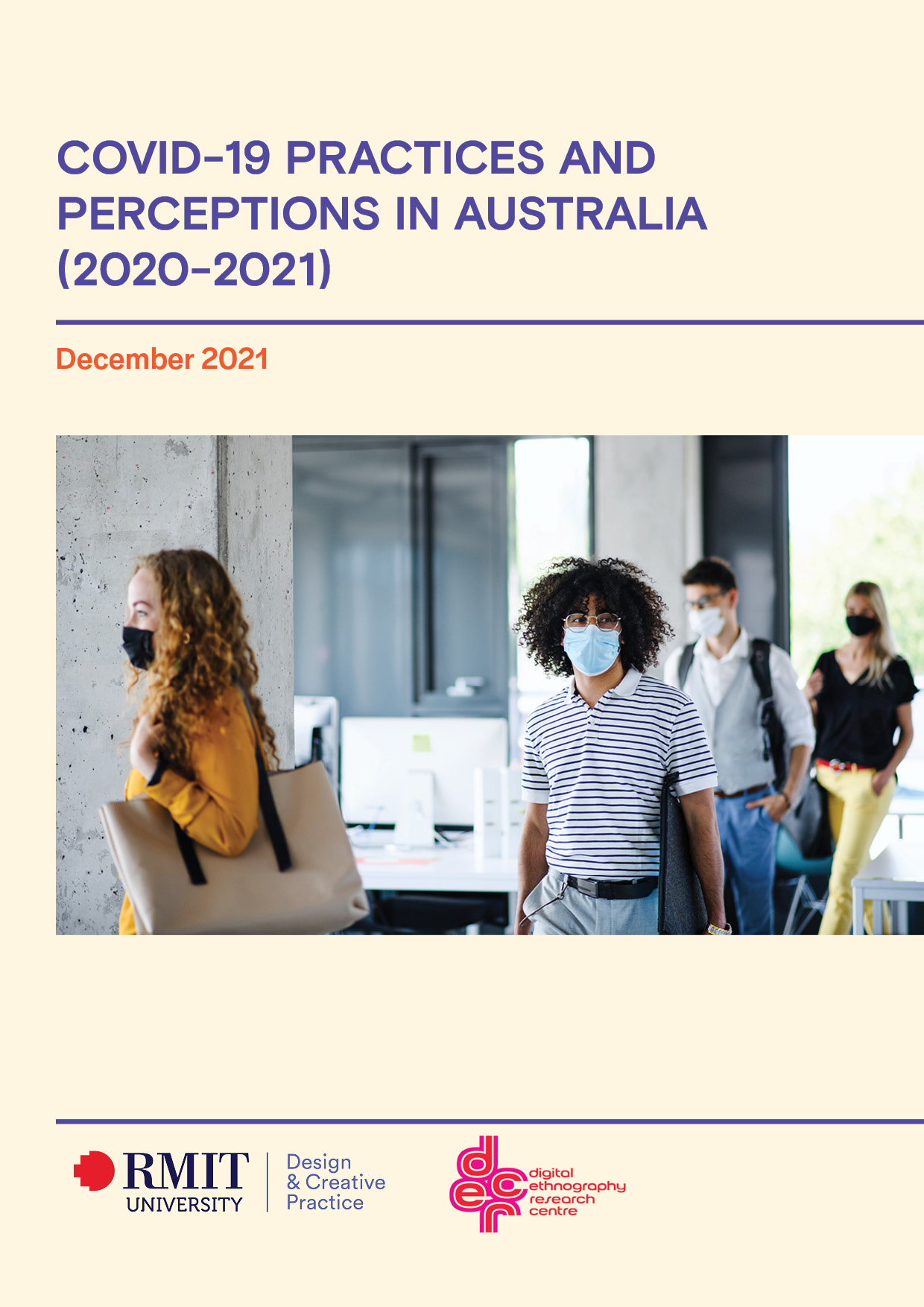
Larissa Hjorth, Hugh Davies, Mark Andrejevic, Ruth DeSouza, and Ingrid Richardson.
Summary
This research project investigated the impacts of the COVID-19 pandemic on people living in Australia, with a particular focus on their experiences, perceptions and practices — especially in terms of tracking technologies (the COVIDSafe app, the use of QR codes), masks and other prosocial techniques. The project also explored changing public perceptions in relation to media, government response, lockdowns, vaccinations and public space during this time.
Findings from our mixed methods research study show a range of ways in which people track their behaviour and that of others around them. We suggest that public health discourses have created new subjectivities which expand the scope of existing self-policing and policing strategies.
Suggested Citation
Hjorth, Larissa, Davies, Hugh, Andrejevic, Mark, DeSouza, Ruth, and Richardson, Ingrid. (2021). COVID-19 Practices and Perceptions in Australia (2020−2021) Melbourne, RMIT University.
If you would like to get involved with this project, fill out the form below or reach out to project leaders via the contact info provided alongside each bio.
People
Larissa Hjorth
Distinguished Professor and Director, Design and Creative Practice
School: Enabling Capability Platforms
Larissa Hjorth is a digital ethnographer, artist, Distinguished Professor and director of the Design & Creative Practice ECP platform at RMIT University. With Professor Heather Horst, she co-founded the Digital Ethnography Research Centre (DERC). Previously, Hjorth was Deputy Dean, Research & Innovation, in the School of Media & Communication (2013−2016). Hjorth served on the inaugural Australian Research Council (ARC) Engagement & Impact Pilot study assessment panel for humanities and creative practice.
Hjorth studies the socio-cultural dimensions of mobile media and play practices in the Asia-Pacific region with an emphasis on interdisciplinary, collaborative and cross-cultural approaches. She has published a dozen co-authored books, edited over a dozen Handbooks/Companions and has over 40 journal articles.
More recently, Hjorth’s work has become concerned with how we can bring creative, social and design solutions to the growing ageing populations and, in turn, how we might consider scenarios of what it means to die well. She is also studying how our “more-than-human” companions can teach us about new media in everyday life. Hjorth’s last book, Haunting Hands (Oxford Uni Press) looked at how mobile media is being deployed in situations of grief and trauma, her previous book explored how art practice can teach us new acumen into the climate change debate.
Hjorth’s books include Haunting Hands (with Cumiskey 2017), Screen Ecologies (with Pink, Sharp & Williams 2016), Digital Ethnography (Pink et al. 2016) Mobile Media in the Asia-Pacific (2009), Games & Gaming (2010), Online@AsiaPacific (with Arnold 2013), Understanding Social Media (with Hinton 2013), and Gaming in Locative, Social and Mobile Media (with Richardson 2014).
Hugh Davies
Postdoctoral Research Fellow
School: Games
Hugh Davies is an artist, curator and researcher of games and play. His practice explores histories of media devices and cultures of games in the Asia Pacific Region. Awarded a PhD in Art, Design and Architecture from Monash University in 2014, Hugh’s studies in game cultures have been supported with fellowships from Tokyo Art and Space, M+ Museum of Visual Culture and the Hong Kong Design Trust. Hugh is currently a postdoctoral research fellow at RMIT in Melbourne, Australia.
Ingrid Richardson
Professor
School: Media and Communication
Professor Ingrid Richardson has been teaching, supervising and researching in the fields of digital media, mobile media and games for over twenty years. She has a broad interest in the human-technology relation and has published widely on the phenomenology of games and mobile media, digital ethnography and innovative research methods, the relation between technology use and wellbeing, and the cultural effects of urban screens, wearable technologies, virtual and augmented reality, remix culture and web-based content creation and distribution. Ingrid has led or co-led 14 funded research projects, the most recent being an ARC DP [Games of Being Mobile] with Larissa Hjorth. She is contributing co-editor of Studying Mobile Media (Routledge, 2011) and co-author of Gaming in Social, Locative and Mobile Media (Palgrave, 2014), Ambient Play (MIT, 2020), Understanding Games and Game Cultures (Sage, 2020), Exploring Minecraft: Ethnographies of Play and Creativity (Palgrave, forthcoming), and Mobile Media and the Urban Night (Palgrave, forthcoming). Ingrid brings ten years’ experience in university-level HDR management and during this time has actively championed and supported creative methods and practice-led postgraduate research. Over the past five years she has also developed a passion for teaching critical web literacy skills to undergraduate students across all disciplines.
Mark Andrejevic
Professor
School: Media, Film, and Journalism
Mark Andrejevic (Professor, School of Media, Film, and Journalism, Monash University) contributes expertise in the social and cultural implications of data mining, and online monitoring. He writes about monitoring and data mining from a socio-cultural perspective, and is the author of three monographs and more than 60 academic articles and book chapters. He was the Chief Investigator for an ARC QEII Fellowship investigating public attitudes toward the collection of personal information online ($390,000; 2010 – 2014).
Andrejevic has experience conducting both quantitative and qualitative research and is experienced in the focus group and interview methodologies. His work on the personal information project, for example, generated a book, 11 articles and book chapters, and a report on Australian attitudes toward online privacy that was launched by the Federal Privacy Commissioner.
Ruth De Souza
VC Research Fellow
School: School of Art
Dr Ruth De Souza (FACN) is a Vice-Chancellor’s Fellow at RMIT, based in the School of Art and DCP Research Platform. She is a nurse, academic and a community-engaged researcher in gender, race, health and digital technologies. Ruth’s Fellowship will engage health professionals in finding new ways to understand, co-design and implement sustainable cultural safety initiatives in a range of health contexts in response to health inequities.
Prior to moving to Australia in 2013, Ruth worked at AUT University where she taught in the School of Nursing, led the Bachelor of Health Promotion, and was a Senior Research Fellow at the Centre for Asian and Migrant Health Research. Since her arrival in Australia, Ruth has undertaken a wide range of roles, including leading an undergraduate nursing program at Monash University’s Berwick campus; spearheading a unique community-engaged joint research appointment with North Richmond Community Health exploring how wearables and other digital technologies are perceived by people from culturally and linguistically different backgrounds and co-ordinating an interdisciplinary Data Systems and Society Research Network across the University of Melbourne. Ruth has also investigated the applicability of cultural safety in Australia, working closely with The Congress of Aboriginal and Torres Strait Islander Nurses and Midwives (CATSINaM), presenting at their National Professional Development Conferences and delivering training on cultural safety. She has also undertaken a two-year cultural safety project with cohealth (a not-for-profit community health organisation) and Our Watch who work for the primary prevention of violence against women and their children.
2020 ↓↑
Older Adult and Animal Companionship
Cherished Pets & RMIT Pilot Study
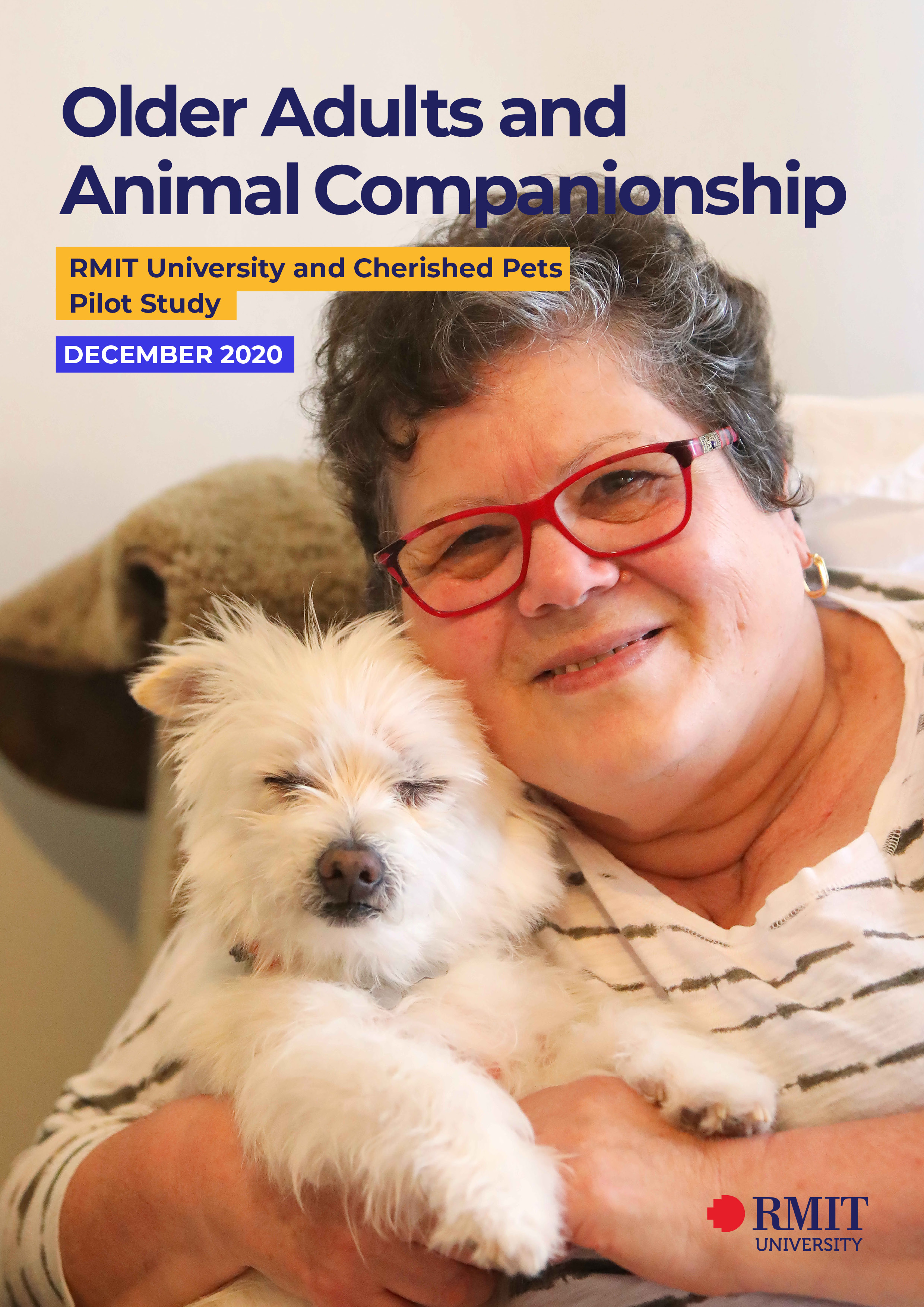
Summary
The physical isolation of COVID-19 restrictions have impacted greatly on all aspects of society — especially on the vulnerable. For many isolated older adults, animal companions played a key role in supporting their social and emotional wellbeing.
Cherished Pets (CP) is a charity committed to supporting the lives of older adults through animal-human centred approaches to care and independent living. The organisation also supports research into understanding the role that companion pets play in improving the lives of vulnerable people.
From July to October 2020, we connected with CP beneficiaries and volunteers to explore their experiences, perceptions and practices. The aim of the exploratory study was to reflect on the significant value of animals in the lives of older adults, and the important role of CP in facilitating these experiences. We combined ethnographic interviews with digital storytelling to elicit creative ways for collecting older adult participants’ stories.
This report captures the experience of some of the key members of the community and how they value CP. Learnings from this fieldwork will be taken into the place-making game, Pet Playing for Placemaking [PP4P]. We need further research that evidences the value and positive effect of animal companionship in the lives of older people, while also considering how the public can become involved in supporting more sustainable systems for ageing in place (at home).
Suggested Citation
Hjorth, L., & Richardson, I. (2020). Older Adult and Animal Companionship during COVID-19: Pilot Study. Melbourne: RMIT University.
If you would like to get involved with this project, fill out the form below or reach out to project leaders via the contact info provided alongside each bio.
People
Larissa Hjorth
Distinguished Professor and Director, Design and Creative Practice
School: Enabling Capability Platforms
Larissa Hjorth is a digital ethnographer, artist, Distinguished Professor and director of the Design & Creative Practice ECP platform at RMIT University. With Professor Heather Horst, she co-founded the Digital Ethnography Research Centre (DERC). Previously, Hjorth was Deputy Dean, Research & Innovation, in the School of Media & Communication (2013−2016). Hjorth served on the inaugural Australian Research Council (ARC) Engagement & Impact Pilot study assessment panel for humanities and creative practice.
Hjorth studies the socio-cultural dimensions of mobile media and play practices in the Asia-Pacific region with an emphasis on interdisciplinary, collaborative and cross-cultural approaches. She has published a dozen co-authored books, edited over a dozen Handbooks/Companions and has over 40 journal articles.
More recently, Hjorth’s work has become concerned with how we can bring creative, social and design solutions to the growing ageing populations and, in turn, how we might consider scenarios of what it means to die well. She is also studying how our “more-than-human” companions can teach us about new media in everyday life. Hjorth’s last book, Haunting Hands (Oxford Uni Press) looked at how mobile media is being deployed in situations of grief and trauma, her previous book explored how art practice can teach us new acumen into the climate change debate.
Hjorth’s books include Haunting Hands (with Cumiskey 2017), Screen Ecologies (with Pink, Sharp & Williams 2016), Digital Ethnography (Pink et al. 2016) Mobile Media in the Asia-Pacific (2009), Games & Gaming (2010), Online@AsiaPacific (with Arnold 2013), Understanding Social Media (with Hinton 2013), and Gaming in Locative, Social and Mobile Media (with Richardson 2014).
Ingrid Richardson
Professor
School: Media and Communication
Professor Ingrid Richardson has been teaching, supervising and researching in the fields of digital media, mobile media and games for over twenty years. She has a broad interest in the human-technology relation and has published widely on the phenomenology of games and mobile media, digital ethnography and innovative research methods, the relation between technology use and wellbeing, and the cultural effects of urban screens, wearable technologies, virtual and augmented reality, remix culture and web-based content creation and distribution. Ingrid has led or co-led 14 funded research projects, the most recent being an ARC DP [Games of Being Mobile] with Larissa Hjorth. She is contributing co-editor of Studying Mobile Media (Routledge, 2011) and co-author of Gaming in Social, Locative and Mobile Media (Palgrave, 2014), Ambient Play (MIT, 2020), Understanding Games and Game Cultures (Sage, 2020), Exploring Minecraft: Ethnographies of Play and Creativity (Palgrave, forthcoming), and Mobile Media and the Urban Night (Palgrave, forthcoming). Ingrid brings ten years’ experience in university-level HDR management and during this time has actively championed and supported creative methods and practice-led postgraduate research. Over the past five years she has also developed a passion for teaching critical web literacy skills to undergraduate students across all disciplines.
COVIDSafe: Perceptions and Practices
October 2020
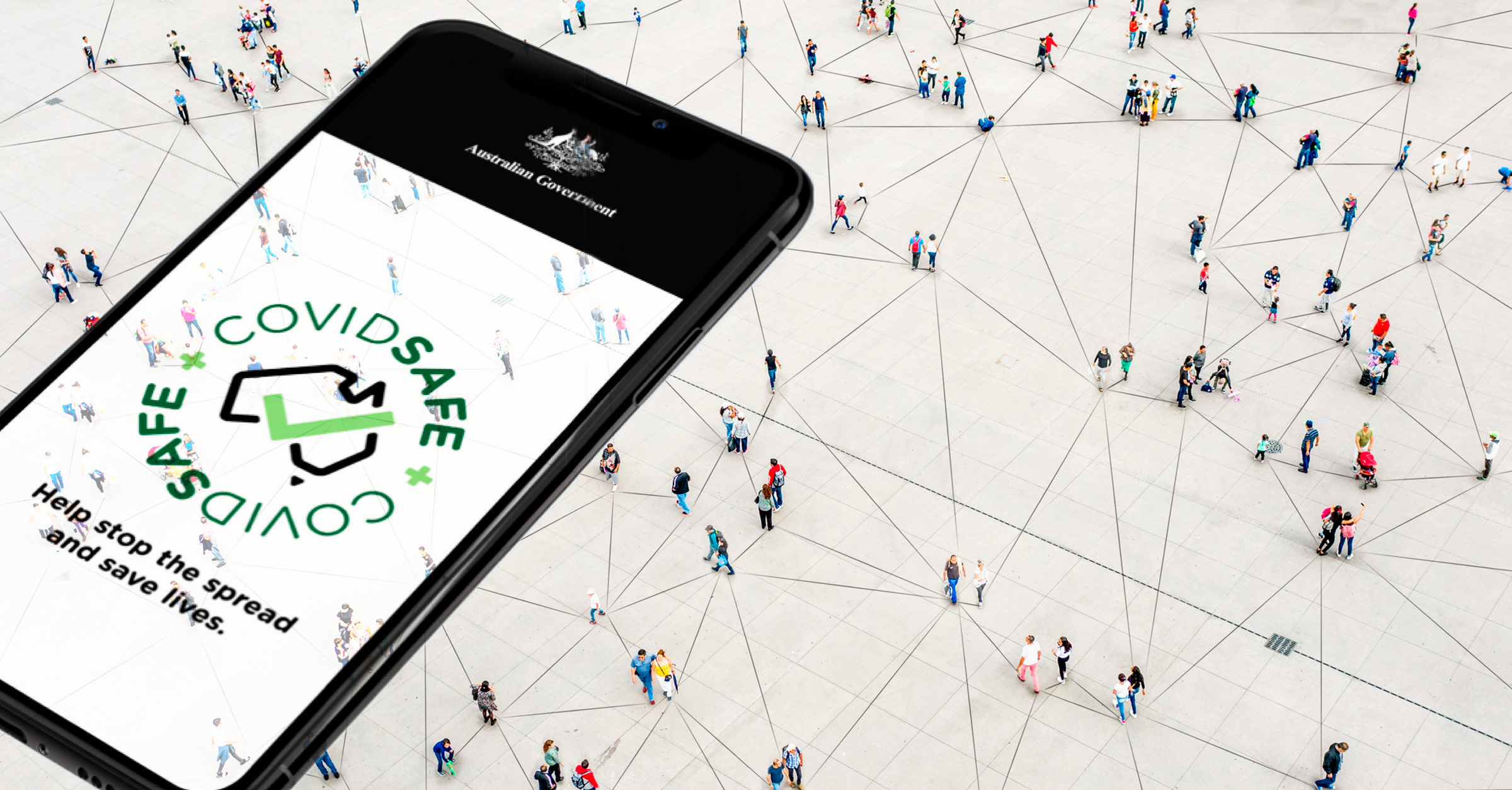
Summary Report
Larissa Hjorth, Ingrid Richardson, Mark Andrejevic, Ruth De Souza, Hugh Davies
Recognising the social, civil and governance impact of the COVID-19 crisis, COVIDSafe: Perceptions and Practices has sought to discover how Australians are understanding and responding to these changes at a community and personal level.
Beginning in June 2020, the project initially aimed to understand people’s experiences and practices of the COVIDSafe App in Australia, both in terms of use and non-use. We distributed a 25 question Qualtrics survey via social media to explore what people thought about the app, relating to privacy concerns, efficacy, clarity of government information and processes. In addition, we asked them if they had downloaded the app (or not) and the range of reasons for doing so or not (e.g. concerns about the health of oneself and others, concerns about privacy of information and tracking apps, etc.)
If you would like to get involved with this project, fill out the form below or reach out to project leaders via the contact info provided alongside each bio.
People
Larissa Hjorth
Distinguished Professor and Director, Design and Creative Practice
School: Enabling Capability Platforms
Larissa Hjorth is a digital ethnographer, artist, Distinguished Professor and director of the Design & Creative Practice ECP platform at RMIT University. With Professor Heather Horst, she co-founded the Digital Ethnography Research Centre (DERC). Previously, Hjorth was Deputy Dean, Research & Innovation, in the School of Media & Communication (2013−2016). Hjorth served on the inaugural Australian Research Council (ARC) Engagement & Impact Pilot study assessment panel for humanities and creative practice.
Hjorth studies the socio-cultural dimensions of mobile media and play practices in the Asia-Pacific region with an emphasis on interdisciplinary, collaborative and cross-cultural approaches. She has published a dozen co-authored books, edited over a dozen Handbooks/Companions and has over 40 journal articles.
More recently, Hjorth’s work has become concerned with how we can bring creative, social and design solutions to the growing ageing populations and, in turn, how we might consider scenarios of what it means to die well. She is also studying how our “more-than-human” companions can teach us about new media in everyday life. Hjorth’s last book, Haunting Hands (Oxford Uni Press) looked at how mobile media is being deployed in situations of grief and trauma, her previous book explored how art practice can teach us new acumen into the climate change debate.
Hjorth’s books include Haunting Hands (with Cumiskey 2017), Screen Ecologies (with Pink, Sharp & Williams 2016), Digital Ethnography (Pink et al. 2016) Mobile Media in the Asia-Pacific (2009), Games & Gaming (2010), Online@AsiaPacific (with Arnold 2013), Understanding Social Media (with Hinton 2013), and Gaming in Locative, Social and Mobile Media (with Richardson 2014).
Hugh Davies
Postdoctoral Research Fellow
School: Games
Hugh Davies is an artist, curator and researcher of games and play. His practice explores histories of media devices and cultures of games in the Asia Pacific Region. Awarded a PhD in Art, Design and Architecture from Monash University in 2014, Hugh’s studies in game cultures have been supported with fellowships from Tokyo Art and Space, M+ Museum of Visual Culture and the Hong Kong Design Trust. Hugh is currently a postdoctoral research fellow at RMIT in Melbourne, Australia.
Ingrid Richardson
Professor
School: Media and Communication
Professor Ingrid Richardson has been teaching, supervising and researching in the fields of digital media, mobile media and games for over twenty years. She has a broad interest in the human-technology relation and has published widely on the phenomenology of games and mobile media, digital ethnography and innovative research methods, the relation between technology use and wellbeing, and the cultural effects of urban screens, wearable technologies, virtual and augmented reality, remix culture and web-based content creation and distribution. Ingrid has led or co-led 14 funded research projects, the most recent being an ARC DP [Games of Being Mobile] with Larissa Hjorth. She is contributing co-editor of Studying Mobile Media (Routledge, 2011) and co-author of Gaming in Social, Locative and Mobile Media (Palgrave, 2014), Ambient Play (MIT, 2020), Understanding Games and Game Cultures (Sage, 2020), Exploring Minecraft: Ethnographies of Play and Creativity (Palgrave, forthcoming), and Mobile Media and the Urban Night (Palgrave, forthcoming). Ingrid brings ten years’ experience in university-level HDR management and during this time has actively championed and supported creative methods and practice-led postgraduate research. Over the past five years she has also developed a passion for teaching critical web literacy skills to undergraduate students across all disciplines.
Ruth De Souza
VC Research Fellow
School: School of Art
Dr Ruth De Souza (FACN) is a Vice-Chancellor’s Fellow at RMIT, based in the School of Art and DCP Research Platform. She is a nurse, academic and a community-engaged researcher in gender, race, health and digital technologies. Ruth’s Fellowship will engage health professionals in finding new ways to understand, co-design and implement sustainable cultural safety initiatives in a range of health contexts in response to health inequities.
Prior to moving to Australia in 2013, Ruth worked at AUT University where she taught in the School of Nursing, led the Bachelor of Health Promotion, and was a Senior Research Fellow at the Centre for Asian and Migrant Health Research. Since her arrival in Australia, Ruth has undertaken a wide range of roles, including leading an undergraduate nursing program at Monash University’s Berwick campus; spearheading a unique community-engaged joint research appointment with North Richmond Community Health exploring how wearables and other digital technologies are perceived by people from culturally and linguistically different backgrounds and co-ordinating an interdisciplinary Data Systems and Society Research Network across the University of Melbourne. Ruth has also investigated the applicability of cultural safety in Australia, working closely with The Congress of Aboriginal and Torres Strait Islander Nurses and Midwives (CATSINaM), presenting at their National Professional Development Conferences and delivering training on cultural safety. She has also undertaken a two-year cultural safety project with cohealth (a not-for-profit community health organisation) and Our Watch who work for the primary prevention of violence against women and their children.
In a time of uncertainty: supporting belonging and well being of HDR students
May 2020
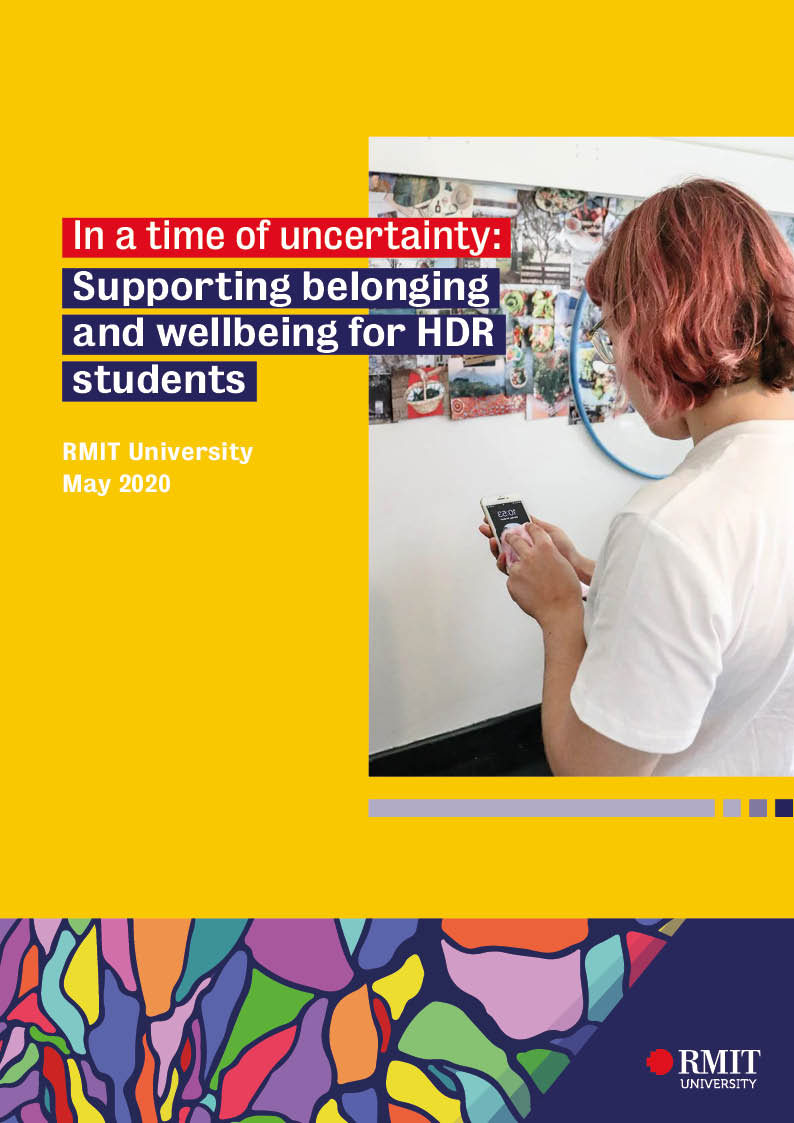
DeSouza, R., Hendry, N., Stevens, R., Gomes, C., Harris, A., Hjorth, L., Richardson, I., & Kokanovic, R.
Summary
The COVID-19 pandemic has caused major disruption, stress and uncertainty for Australian Higher Degree Research (HDR) students (Kariotis, 2020) — exacerbating the demands of an already challenging journey towards completion (Batty et al., 2019; Creely & Laletas, 2020).
HDR students constitute society’s future knowledge workers (Mackie & Bates, 2019) and the repercussions of COVID-19 represent a significant loss of potential for students, with implications for their research aspirations and current and future employment. As Universities grapple with how to best support HDR students through this crisis, we offer a contribution to the understanding that acknowledges the complexity of journey as an intellectual development that has emotional and affective components (Owens et al., 2020).
Becoming a graduate researcher is a transformative identity journey involving becoming an expert in a particular field and becoming a scholar or researcher (Barnacle & Mewburn, 2010). We take a social ecological approach to the challenges that COVID-19 presents to acknowledge that there are multiple factors in both the University environment and the student’s social world that exert a “cumulative and combined influence on wellbeing”’ (Mackie & Bates, 2019).
Suggested Citation
DeSouza, R., Hendry, N., Stevens, R., Gomes, C., Harris, A., Hjorth, L., Richardson, I., & Kokanovic, R. (2020). In a time of uncertainty: supporting belonging and wellbeing for HDR students. Melbourne: RMIT University.
If you would like to get involved with this project, fill out the form below or reach out to project leaders via the contact info provided alongside each bio.
People
Anne Harris
Associate Professor and Principal Research Fellow, Design and Social Context
School: Education
+61 3 9925 4459
RMIT staff profile
anne.harris@rmit.edu.au
Dr Anne M. Harris, PhD is an Associate Professor and Vice Chancellor’s Principal Research Fellow at RMIT University, and an Australian Research Council Future Fellow (2017 – 2021) studying intercultural creativity. Anne is an Honorary Research Fellow at University of Nottingham (UK) and an Adjunct Professor at Monash University (Australia).
Their research is in the areas of gender, creativity, diversity, performance and emerging digital ethnographies. Anne is a native New Yorker and has worked professionally as a playwright, teaching artist and journalist in the USA and Australia. They have authored or co-authored over 60 articles and 13 books on creativity, arts, and non-dominant culture formations, the latest being Queering Families/Schooling Publics: Keywords (with Stacy Holman Jones, Sandra Faulkner, and Eloise Brook, Routledge 2017). Anne is the creator and series editor of the Palgrave book series Creativity, Education and the Arts, and recently completed an Australian Research Council DECRA on the commodification of creativity.
Catherine Gomes
Associate Professor
School: Media and Communication
Catherine Gomes is an Associate Professor in RMIT University’s School of Media and Communication. Catherine is an ethnographer whose work contributes to the understanding of the evolving migration, mobility and digital media nexus. As a migration and mobility scholar, Catherine specialises on the social, cultural and communication spaces of transient migrants, especially international students, their wellbeing, their social groups and their digital engagements. Catherine’s work covers the themes of identity, ethnicity, race, memory and gender. She is a specialist on the Asia-Pacific with Australia and Singapore being significant fieldwork sites. Catherine has experience in mixed methods and interdisciplinary research.
Catherine’s work on transient migration and digital technology is advancing work on migration and mobility because of the transient-digital nexus she pioneers. Moreover, as founding editor of Transitions: Journal of Transient Migration Migration (Intellect), editor of the Culture, Media and Communication in Migrant Societies book series (Amsterdam University Press) and lab leader of the Migration and Digital Media Research Lab housed in the Digital Ethnography Research Centre (DERC), Catherine facilitates intellectual discussions with the aim of generating practical outcomes to address and assist policymakers and stakeholders interested in transient migration and international mobility.
Larissa Hjorth
Distinguished Professor and Director, Design and Creative Practice
School: Enabling Capability Platforms
Larissa Hjorth is a digital ethnographer, artist, Distinguished Professor and director of the Design & Creative Practice ECP platform at RMIT University. With Professor Heather Horst, she co-founded the Digital Ethnography Research Centre (DERC). Previously, Hjorth was Deputy Dean, Research & Innovation, in the School of Media & Communication (2013−2016). Hjorth served on the inaugural Australian Research Council (ARC) Engagement & Impact Pilot study assessment panel for humanities and creative practice.
Hjorth studies the socio-cultural dimensions of mobile media and play practices in the Asia-Pacific region with an emphasis on interdisciplinary, collaborative and cross-cultural approaches. She has published a dozen co-authored books, edited over a dozen Handbooks/Companions and has over 40 journal articles.
More recently, Hjorth’s work has become concerned with how we can bring creative, social and design solutions to the growing ageing populations and, in turn, how we might consider scenarios of what it means to die well. She is also studying how our “more-than-human” companions can teach us about new media in everyday life. Hjorth’s last book, Haunting Hands (Oxford Uni Press) looked at how mobile media is being deployed in situations of grief and trauma, her previous book explored how art practice can teach us new acumen into the climate change debate.
Hjorth’s books include Haunting Hands (with Cumiskey 2017), Screen Ecologies (with Pink, Sharp & Williams 2016), Digital Ethnography (Pink et al. 2016) Mobile Media in the Asia-Pacific (2009), Games & Gaming (2010), Online@AsiaPacific (with Arnold 2013), Understanding Social Media (with Hinton 2013), and Gaming in Locative, Social and Mobile Media (with Richardson 2014).
Ingrid Richardson
Professor
School: Media and Communication
Professor Ingrid Richardson has been teaching, supervising and researching in the fields of digital media, mobile media and games for over twenty years. She has a broad interest in the human-technology relation and has published widely on the phenomenology of games and mobile media, digital ethnography and innovative research methods, the relation between technology use and wellbeing, and the cultural effects of urban screens, wearable technologies, virtual and augmented reality, remix culture and web-based content creation and distribution. Ingrid has led or co-led 14 funded research projects, the most recent being an ARC DP [Games of Being Mobile] with Larissa Hjorth. She is contributing co-editor of Studying Mobile Media (Routledge, 2011) and co-author of Gaming in Social, Locative and Mobile Media (Palgrave, 2014), Ambient Play (MIT, 2020), Understanding Games and Game Cultures (Sage, 2020), Exploring Minecraft: Ethnographies of Play and Creativity (Palgrave, forthcoming), and Mobile Media and the Urban Night (Palgrave, forthcoming). Ingrid brings ten years’ experience in university-level HDR management and during this time has actively championed and supported creative methods and practice-led postgraduate research. Over the past five years she has also developed a passion for teaching critical web literacy skills to undergraduate students across all disciplines.
Natalie Hendry
VC Research Fellow
School: Media and Communication
Natalie Hendry is a Vice Chancellor’s Postdoctoral Fellow in the School of Media and Communications. Her research explores everyday social media and digital technology practices in the context of critical approaches to education, mental health, media, wellbeing, youth studies and policy. This brings together her experience prior to academia, working in community education, secondary schools and hospital settings, and consulting for health organisations and industry. Using digital ethnography and creative workshop methods, her postdoctoral research explores emerging and potential online opportunities to enhance digital outreach and media-based support for young people whose parents or adult family members are experiencing mental ill-health.
Renata Kokanovic
Convener, The HEALTH Network; Professor
School: Global, Urban & Social Studies
Professor Renata Kokanovic’s works at the intersections of health, society and medicine, with a particular focus on interdisciplinary mental health research.She combines empirical research with interdisciplinary theoretical and methodological scholarship while collaborating with industry partners and health care users to facilitate greater understanding of lived experiences of health and illness.
She co-founded Healthtalk Australia, a digital repository of health and illness narrative accounts designed to support people experiencing ill health, and inform health and social care delivery and policy.
Ruth De Souza
VC Research Fellow
School: School of Art
Dr Ruth De Souza (FACN) is a Vice-Chancellor’s Fellow at RMIT, based in the School of Art and DCP Research Platform. She is a nurse, academic and a community-engaged researcher in gender, race, health and digital technologies. Ruth’s Fellowship will engage health professionals in finding new ways to understand, co-design and implement sustainable cultural safety initiatives in a range of health contexts in response to health inequities.
Prior to moving to Australia in 2013, Ruth worked at AUT University where she taught in the School of Nursing, led the Bachelor of Health Promotion, and was a Senior Research Fellow at the Centre for Asian and Migrant Health Research. Since her arrival in Australia, Ruth has undertaken a wide range of roles, including leading an undergraduate nursing program at Monash University’s Berwick campus; spearheading a unique community-engaged joint research appointment with North Richmond Community Health exploring how wearables and other digital technologies are perceived by people from culturally and linguistically different backgrounds and co-ordinating an interdisciplinary Data Systems and Society Research Network across the University of Melbourne. Ruth has also investigated the applicability of cultural safety in Australia, working closely with The Congress of Aboriginal and Torres Strait Islander Nurses and Midwives (CATSINaM), presenting at their National Professional Development Conferences and delivering training on cultural safety. She has also undertaken a two-year cultural safety project with cohealth (a not-for-profit community health organisation) and Our Watch who work for the primary prevention of violence against women and their children.
Nature and extent of gender-based violence in individualised disability support & aged care services in Victoria
October 2020
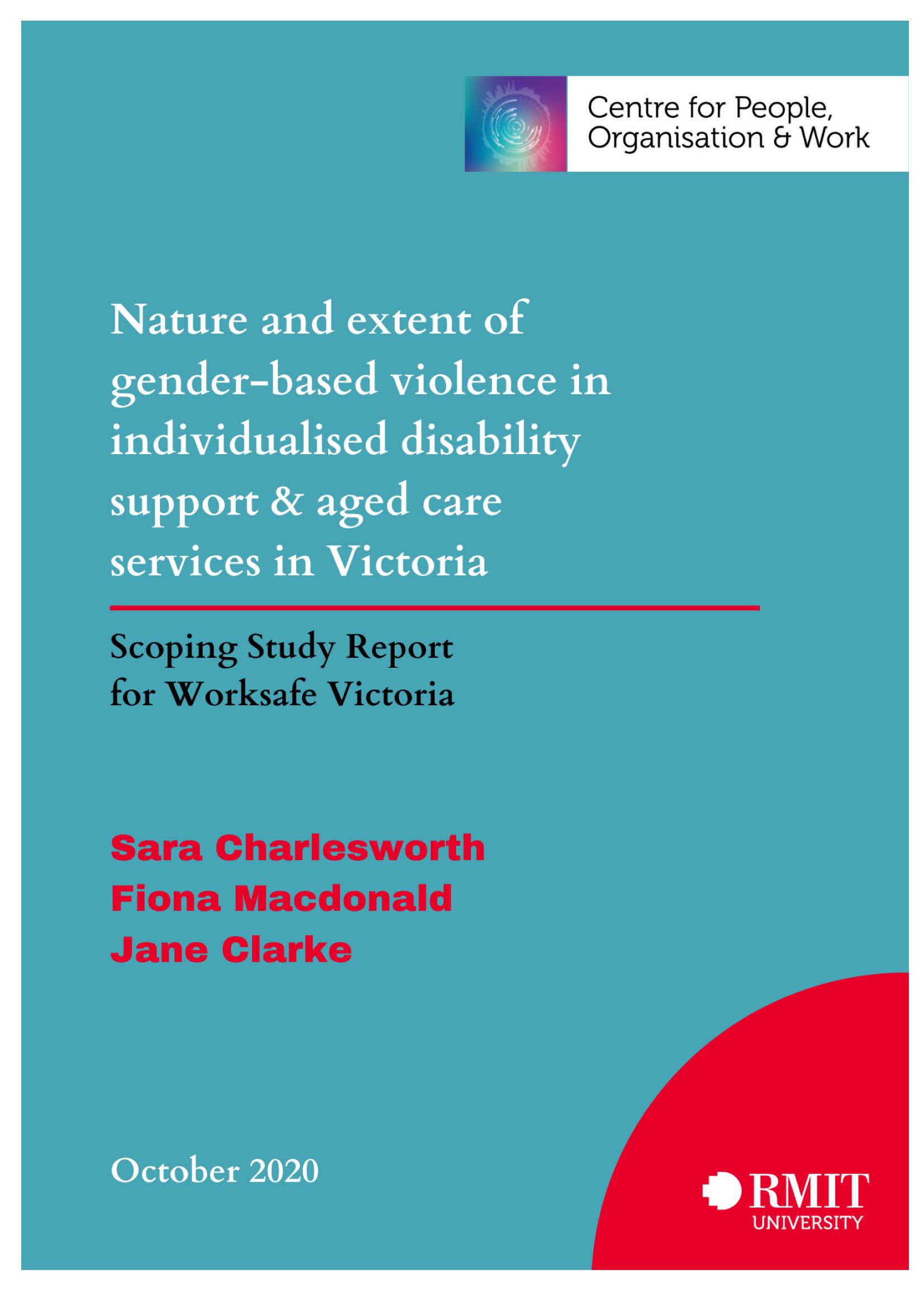
Charlesworth, S., Macdonald, F., & Clarke, J.
Summary
The growing community concern around violence in disability support and aged care services prompted RMIT researchers to consider ways to improve the lives of both service users and workers in home and community-based support and care. Through a series of workshops, Centre for People, Organisation & Work (CPOW) provided an opportunity for Victorian advocacy groups, unions and researchers to identify common concerns and interests around gender-based violence in both individualised aged care and disability support services, and consider ways to tackle these issues.
This 2020 Scoping Study for WorkSafe Victoria is a result of that project.
Suggested Citation
Charlesworth, S, Macdonald F & Clarke J (2020) Nature and extent of gender-based violence in individualised disability support & aged care services in Victoria: Scoping Study Report for Worksafe Victoria. Centre for People Organisation & Work, RMIT University, Melbourne. DOI 10.25439/rmt.13220612
If you would like to get involved with this project, fill out the form below or reach out to project leaders via the contact info provided alongside each bio.
People
Fiona Macdonald
VC Fellow
School: Business
Dr Fiona Macdonald is a Vice-Chancellor’s Senior Research Fellow in the School of Management. Fiona’s research focuses on three interconnected themes: the changing nature of work and employment relationships; regulating for decent work and gender equality; and the political economy of work. The empirical focus of Fiona’s current research on the social care workforce also brings in her long-standing interest in social policy and welfare systems.
In 2016 Fiona was awarded an Australian Research Council Discovery Early Career Researcher Award to examine the workforce challenges of Australia’s new National Disability Insurance Scheme (NDIS). Her research has strong policy relevance and she works closely with industry as well as with national and international networks of employment and care scholars. In 2017 she received the RMIT Vice-Chancellor’s Award for Research impact – Early Career Researcher. Fiona is a member of the Editorial Advisory Board of the recently established International Journal of Care and Caring.
Sara Charlesworth
Distinguished Professor
School: Management
Sara Charlesworth is Professor of Work, Gender & Regulation and Deputy Head of School, (Research & Innovation) in the School of Management. She is an executive member of the Centre for People, Organisation & Work in the College of Business. Sara has published and presented widely in a wide range of academic, policy and community fora and has been involved in a number of key gender equality policy reviews and debates. She was a panel member on the 2012 ACTU Independent Inquiry into Insecure Work, and an advisor to the Australian Human Rights Commission on their 2014 Pregnancy and Return to Work National Review and 2018 National Sexual Harassment Prevalence Survey.
In 2017 Sara was appointed to the Equal Workplaces Advisory Council, a founding reform of the Victorian government’s Gender Equality Strategy. She is currently a member of the Victoria Police VEOHRC Review Academic Governance Board, on the Steering Group of the Migrant Workers Rights Campaign and co-convenor of the Work+Family Policy Roundtable. Sara is a Fellow of the Future Social Services Institute and is on the editorial board of the Journal of Industrial Relations.
Sara’s research interests centre on gender inequality in employment at the labour market, industry and organisational levels. She has undertaken a number of Australian Research Council-funded projects. Much of her recent research has focused on paid care work. Together with A/Prof Deb King (Flinders), she completed a large three year Department of Health-funded project, ‘Quality Jobs and Quality Care: Improving work practices to deliver quality aged care jobs & aged care services for older Australians’, in partnership with Brightwater Care, HammondCare, Helping Hand and United Voice.
Design & Creative Practice ECP Four Year Report
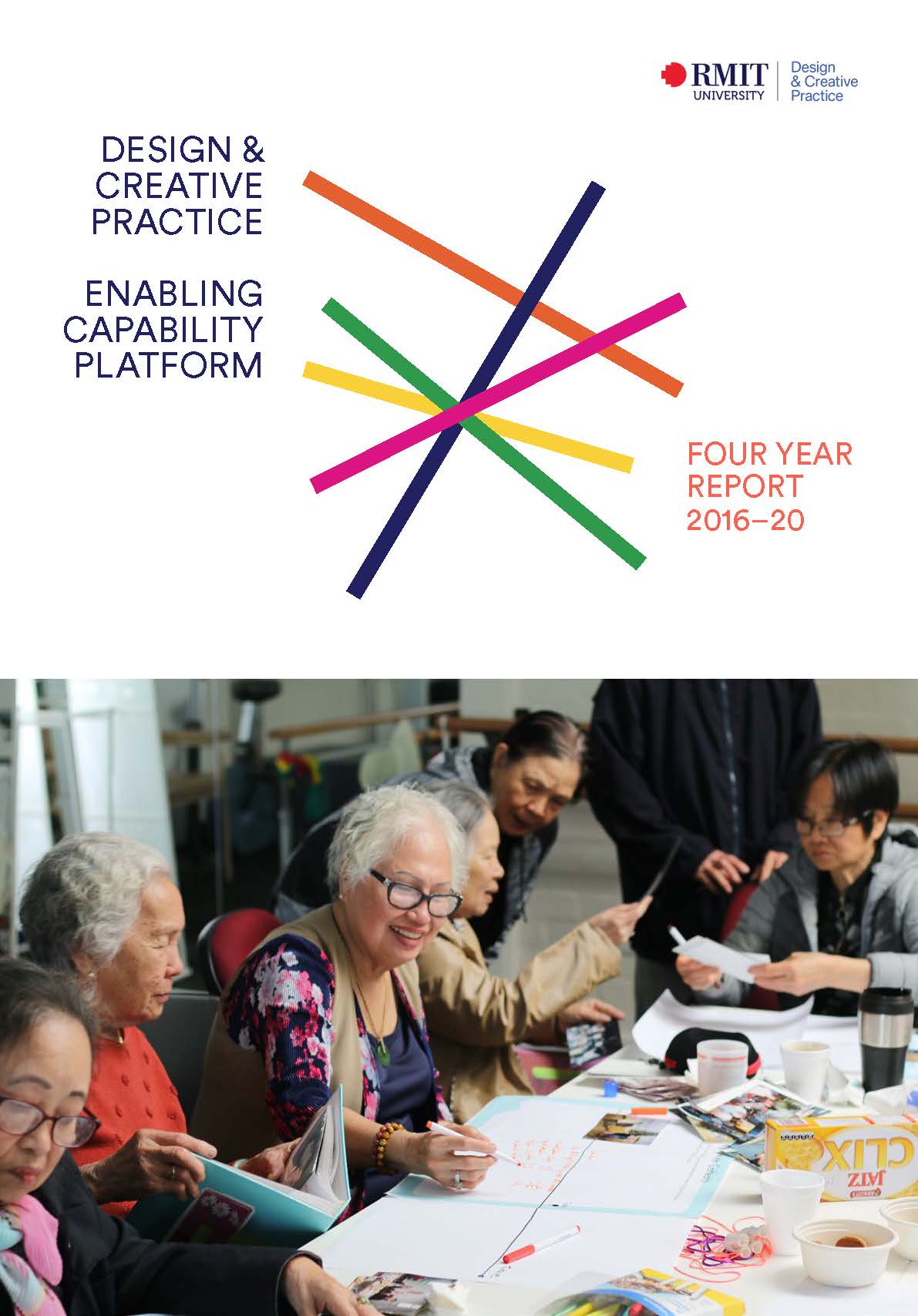
This report marks the four years of the Design & Creative Practice ECP. The research platforms have been committed to fostering interdisciplinary collaboration to address real-world issues. In the first year we codesigned with internal and external stakeholders to determine our key priorities around 1. Resilience, Health and Care; 2. Playful Digital and Material Encounters; 3. The Social and Sustainable; 4. Design & Creative Practice Industries. In years two and three we built capability (expertise, partnerships and systems) around these areas through grants, networks and design
challenges.
In year four, 2020, these themes have become prescient in how we move forward out of the pandemic. In 2020 we have focused on the new ECP Restarts — five key areas (greener, fairer, healthier, digital, better work) to curate and amplify RMIT expertise to address challenges from the pandemic. Guided by the principles of the Sustainable Development Goals (SDGs), the Restarts are taking a variety of formats — from Living Labs and white papers to policy briefs. This report showcases some of the highlights in the Design & Creative Practice ECP journey. We have come so far in conceptualising our research in terms of engagement and impact — a crucial narrative for research moving forward in this country. As we have seen during the pandemic, research not only matters — it saves lives.
All of these collaborations highlight the commitment of RMIT staff and students to the SDGs, Indigenous ways of knowing, and co-designing for social, digital innovation and inclusion.
If you would like to get involved with this project, fill out the form below or reach out to project leaders via the contact info provided alongside each bio.
HDR Belonging: Practices and Perceptions during COVID-19
August 2020
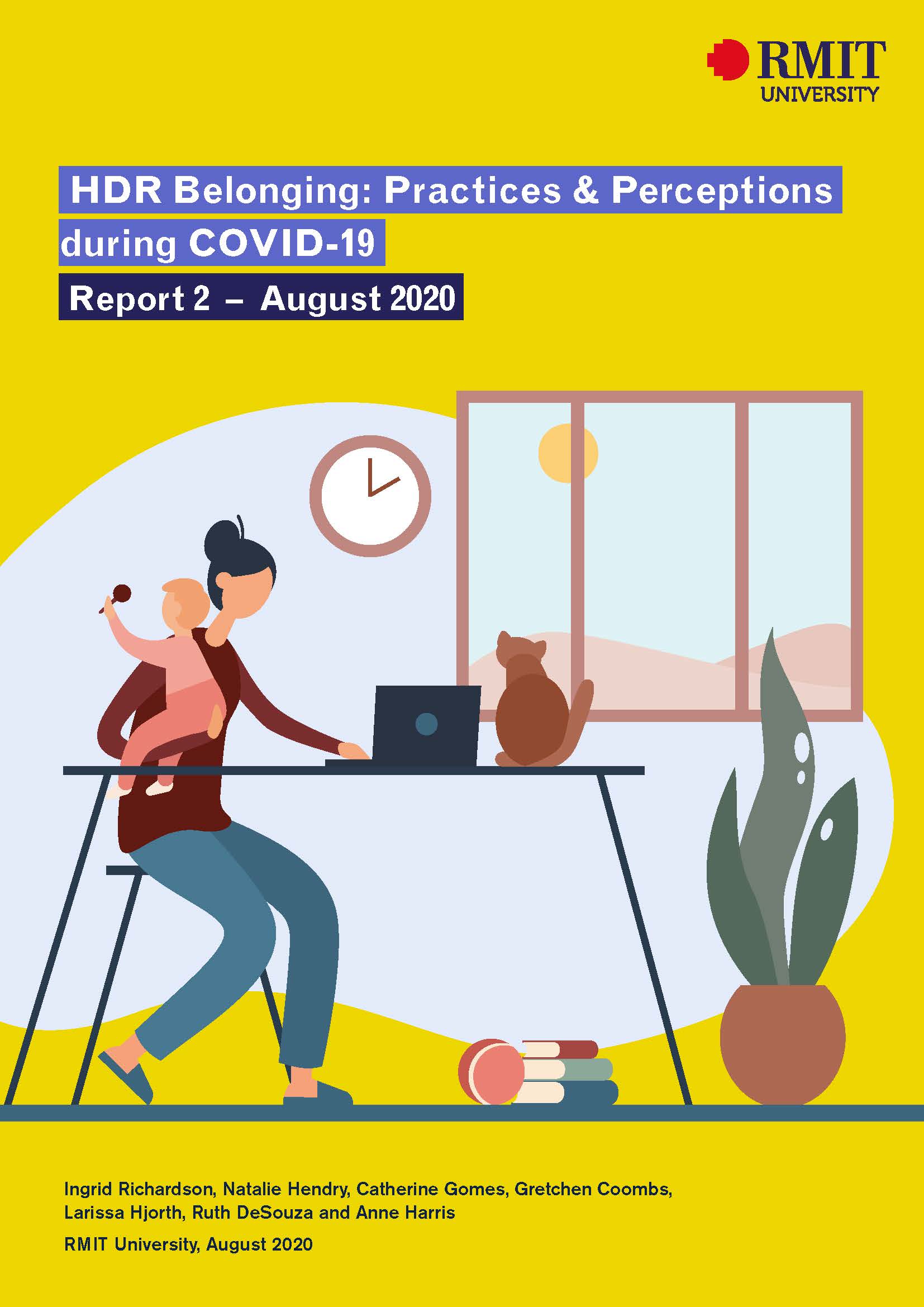
Ingrid Richardson, Natalie Hendry, Catherine Gomes, Gretchen Coombs, Larissa Hjorth, Ruth DeSouza and Anne Harris
Summary
In this report we have outlined some of the key themes, issues, practices and perceptions experienced by HDR candidates relating to:
• Belonging and Communities of Practice
• Working from Home
• Uncertain Futures and Precarious Work
• International Candidates’ Experience
• RMIT Systems and Services
• Ethics of Care
COVID-19 has recalibrated everything — work, life and study — as many of these activities become compressed in the home. Digital amplification can be felt palpably on all areas — in good and less positive ways. For HDRs, this recalibration has added another layer of complexity and instability in an already undulating journey that is both intellectual and psychological. Work futures have rapidly come under revision — compounding the feelings of uncertainty, loss and change.
By listening to the lived experience of HDRs we can work collaboratively to develop nuanced systems and processes that nurture growth during these uncertain times. While digital engagement can help, digital pivots can only provide a certain amount of connection. Connection doesn’t always translate to belonging. Understanding and addressing belonging during the pandemic means developing more agile co-designed methods for engagement and communities of practice to foster a collaborative and sustainable future — both as part of the HDR journey and beyond.
This report has sought to give a voice to the diverse and divergent lived experiences of current HDRs, across different fields of research and stages of the research.
If you would like to get involved with this project, fill out the form below or reach out to project leaders via the contact info provided alongside each bio.
Digital-Fairer Start
Digital Innovation for Social Inclusion: Responding to COVID-19 and beyond
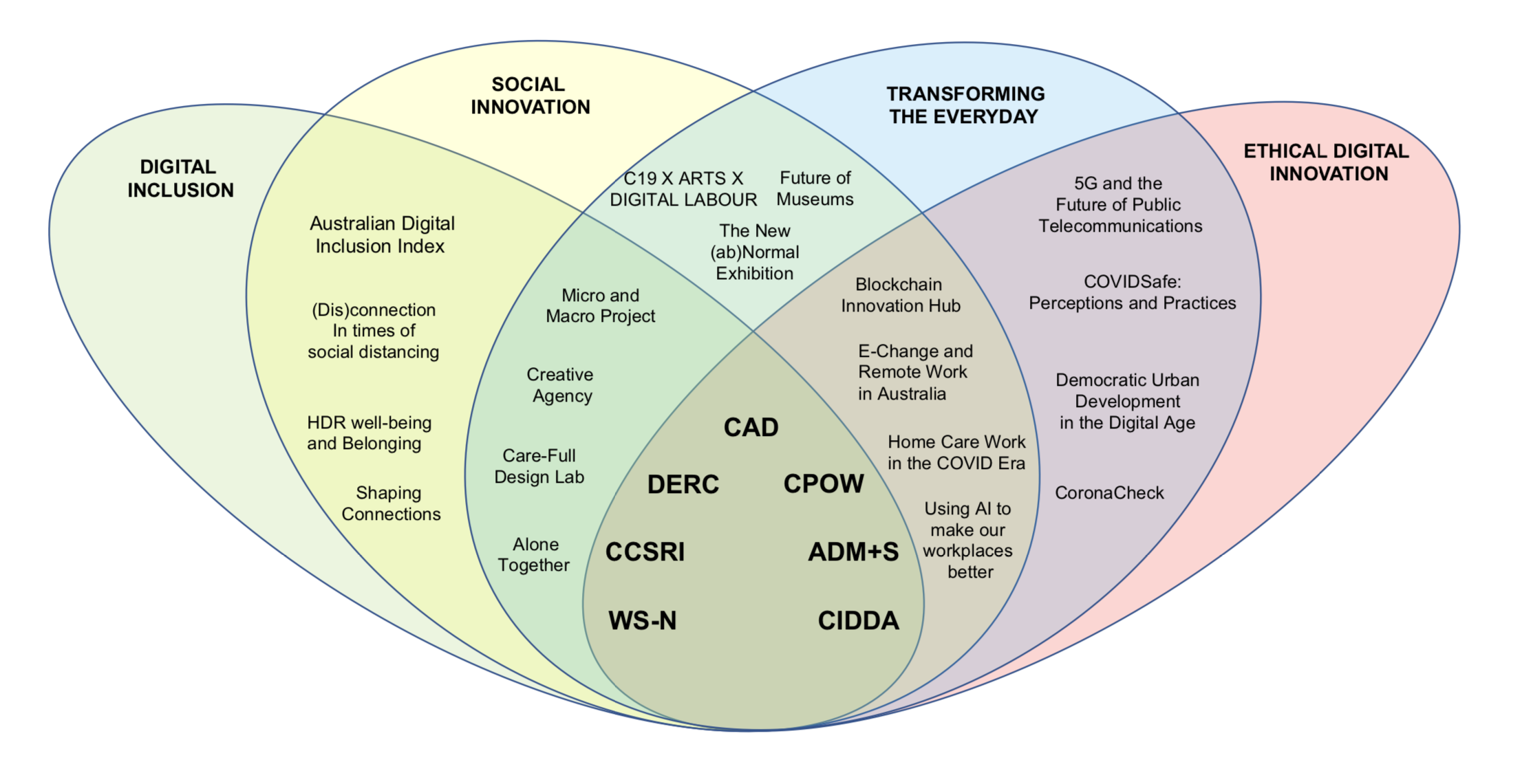
The pandemic has radically transformed how we do things in our life, school, work, and leisure. Digital pivots have rolled out unevenly, amplifying existing inequalities such as digital access and literacy. The present changes are profound enough, but as we move toward a so-called “new normal”, impacts will continue to ripple outward, with far reaching effects. The use of digital technology and social media has grown exponentially, raising the need for a fairer normal. This means addressing the challenges of the pandemic in terms of digital innovations for social inclusion.
RMIT has vast expertise in understanding the role of the digital in everyday life. Researchers from the Digital Ethnography Research Centre (DERC), the Centre of People, Organisation & Work (CPOW), the Blockchain Innovation Hub, the Centre for Information Discovery & Data Analytics (CIDDA) and the Centre for Cyber Security Research & Innovation (CCSRI) have many decades of experience building and testing innovative methods around home, work, and social contexts. Using ethnographic techniques that focus on practice and motivation, they can glean insights which complement big data approaches.
If you would like to get involved with this project, fill out the form below or reach out to project leaders via the contact info provided alongside each bio.
Thinking About Treaty Spatially
June 2020
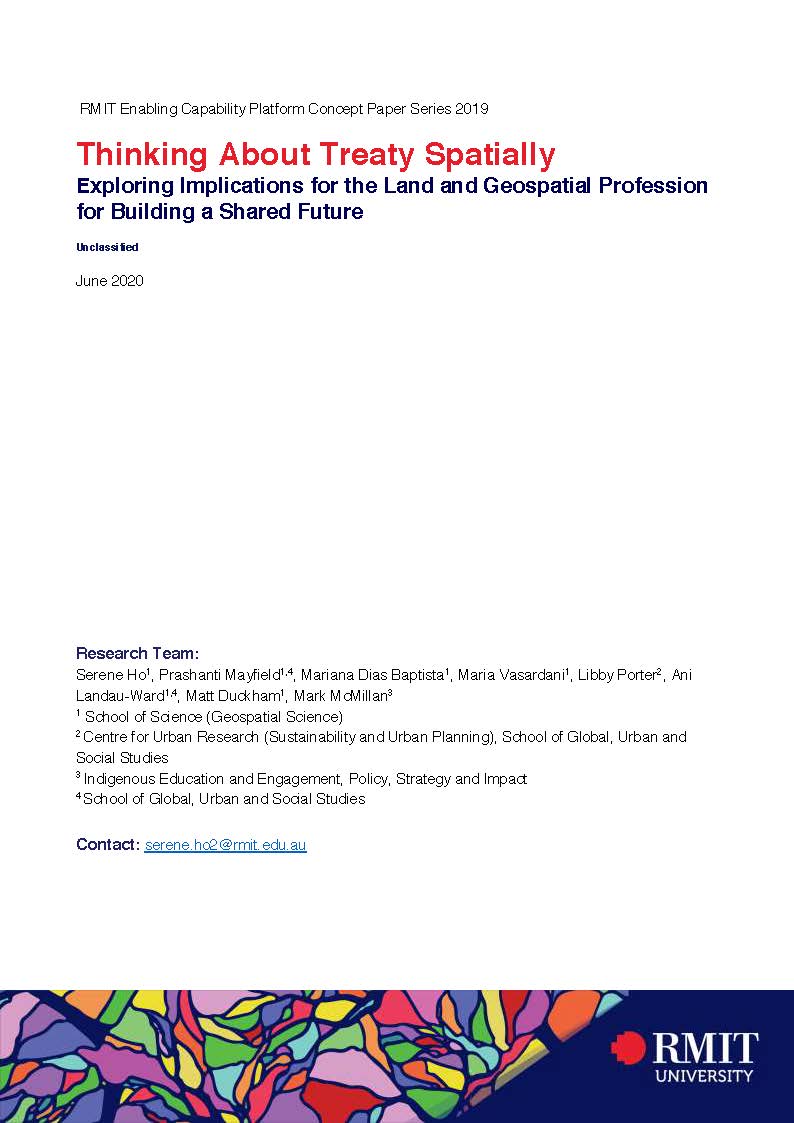
Exploring Implications for the Land and Geospatial Profession for Building a Shared Future
Serene Ho, Prashanti Mayfield, Mariana Dias Baptista, Maria Vasardani, Libby Porter, Ani Landau-Ward, Matt Duckham, Mark McMillan
Summary
In 2018, the Victorian government passed Australia’s first-ever treaty law (State Government of Victoria, 2018) but the new treaty legislation is startingly silent on any direction on spatiality. This reflects a wider silence in both Victorian and federal legislative frameworks which ignore the spatial dimension of treaty negotiations. It leads to the questions: to what places does a negotiated treaty apply, and how should/will treaty affect the use, management, access and ownership of Country, embodying land, water, air, flora, fauna and mineral resources?
Many land and geospatial professionals will find themselves playing a role in helping to address these questions, whether as researchers, consultants, or public servants. The use of spatial data and geographic information systems (GIS) have become mainstreamed as a policy tool, but there are recognised difficulties in applying western-oriented GIS to Indigenous knowledge. Therefore, the central question addressed in this Concept Paper is: What might the spatial implications of treaty be for land and geospatial professionals?
Citation
Ho, S., Mayfield, P., Dias Baptista, M., Vasardani, M., Porter, L., Landau-Ward, A., Duckham, M. and McMillan, M. (2020). Thinking About Treaty Spatially: Exploring Implications for the Land and Geospatial Profession for Building a Shared Future. RMIT Enabling Capability Platform Concept Paper Series 2019 (CP 1904). Melbourne: RMIT University.
If you would like to get involved with this project, fill out the form below or reach out to project leaders via the contact info provided alongside each bio.
Digital Engagement Strategies in Cultural Sector During COVID-19 A Preliminary Report
June 2020
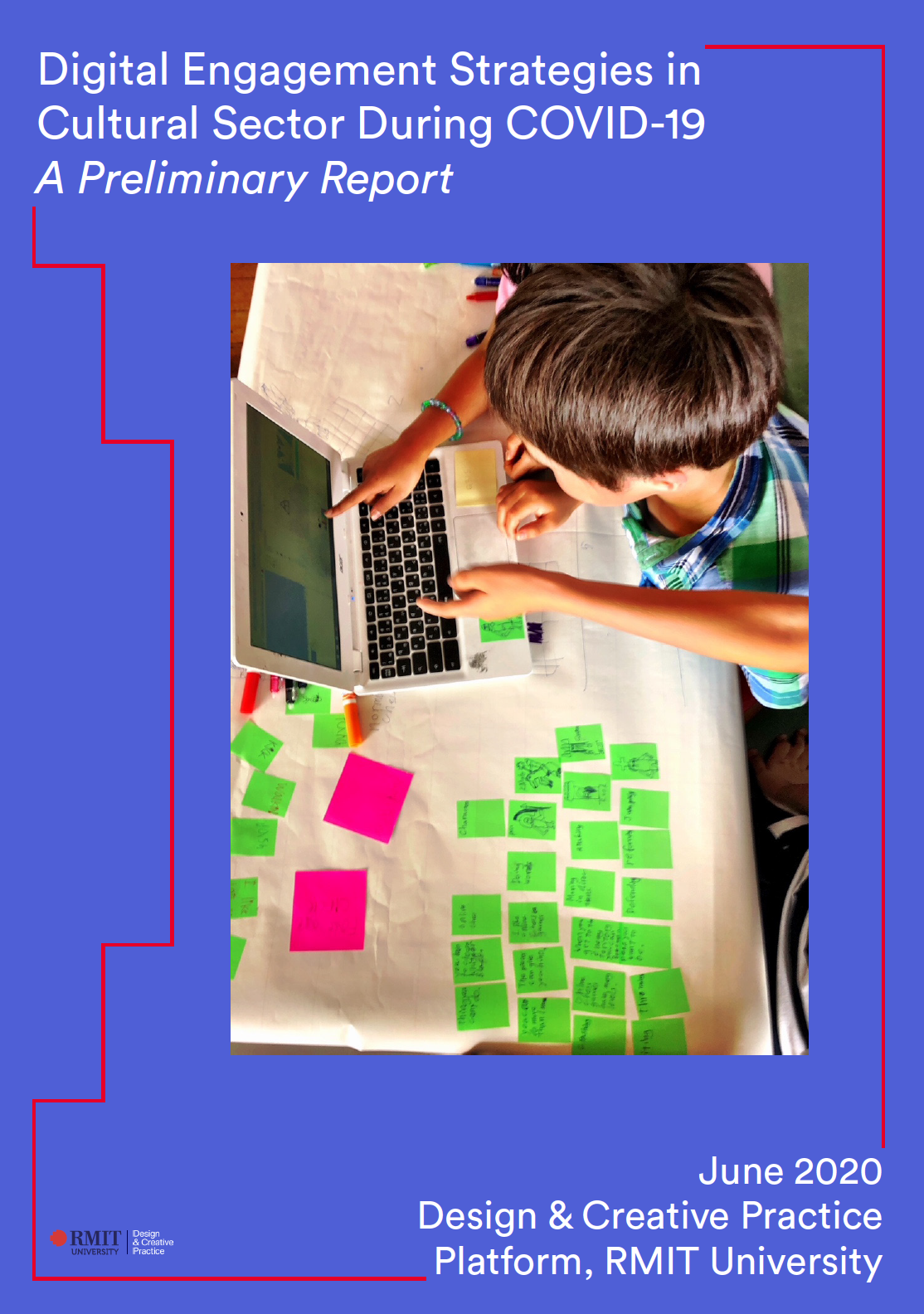
Summary
Museums across Australia and the world have responded to the COVID-19 crisis with new strategies of digital engagement. With physical venues have closed, many institutions have found ways to create, curate and translate modes of engagement for digital contexts. No longer a mere platform for institutional marketing and promotion, social media like Facebook, Instagram, Twitter, Tik Tok and YouTube have all become sites for creative intervention.1 For many, it has been a time of quick digital literacy acquisition and recalibration of curatorial and public engagement methods.
This pandemic has unveiled huge questions about equality, access, how we socialise with each other, and who and what we value and, for our purposes here, and what role of the museum can play as we move forward. Technological solutions in the form of digital engagement have helped combat the epidemic and give us access to arts and culture. According to a recent Patternmakers’ Audience Snapshot Report – COVID-19 Audience Outlook Monitor (AS), 75% of respondents have participated in online arts and culture activities, like watching arts video content (52%), watching live-streamed events (42%), or doing online classes or tutorials (36%) (AS 11).2 In other words, the cultural sector digital engagement has helped communities cope with the quarantine and physical distancing offering alternative way to connect to each other and what we love.
If you would like to get involved with this project, fill out the form below or reach out to project leaders via the contact info provided alongside each bio.
2019 ↓↑
ACMI PILOT STUDY (PHASE 1 REPORT): Social Media, Digital Wayfaring and the Future of Museum Audiences
May 2019
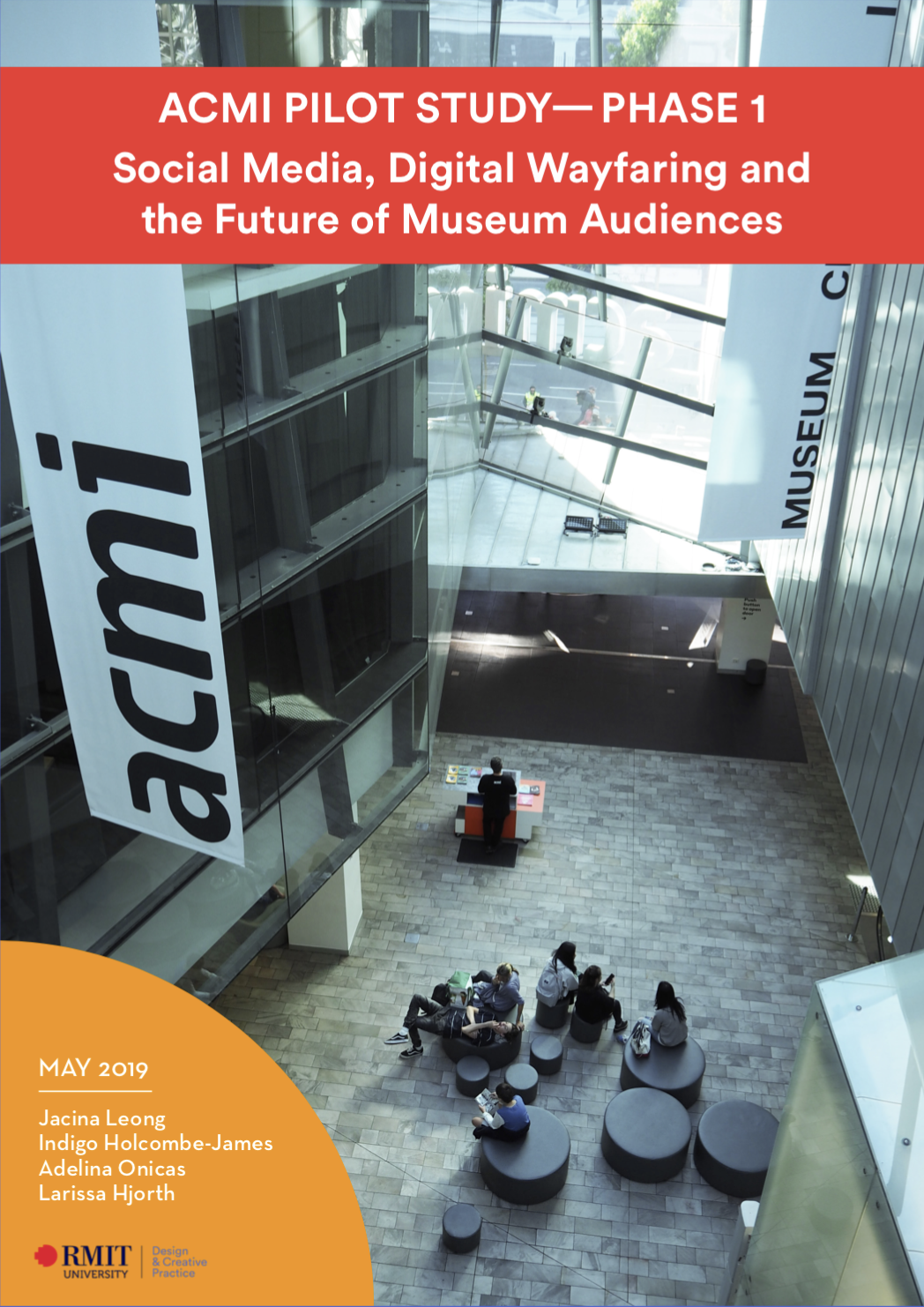
Jacina Leong, Indigo Holcombe-James, Adelina Onicas and Larissa Hjorth
Summary
This ethnographic research design was driven by consultation with members of the ACMI team. Through audience conversations, we developed a series of broad themes that guided our work:
- Feelings: how ACMI audiences felt about the digital and non-digital spaces;
- Behaviours: how ACMI audiences engaged with both digital and non-digital spaces;
- Co-present sociality: how, or whether, ACMI audiences enacted sociality in both digital and non-digital contexts;
- Places & wayfaring: how digital and non-digital spaces were represented and influenced engagement;
- Programming: how ACMI programming influenced digital and non-digital spaces.
The ethnographic research revealed complex relationalities between the places, wayfaring, co-presence (physical and/or digital proximity), and digital sociality that ACMI itself enacted, and that in turn was enacted by ACMI’s audiences. Through combining close analysis of the enacted digital participation by both parties with rich ethnographic data, we demonstrate an opportunity for alignment between institutional and audience-led digital practices.
Based on this insight, we provide recommendations to calibrate differences between perceived and lived participation, through integrating institutional and informal digital practices.
If you would like to get involved with this project, fill out the form below or reach out to project leaders via the contact info provided alongside each bio.
People
Larissa Hjorth
Distinguished Professor and Director, Design and Creative Practice
School: Enabling Capability Platforms
Larissa Hjorth is a digital ethnographer, artist, Distinguished Professor and director of the Design & Creative Practice ECP platform at RMIT University. With Professor Heather Horst, she co-founded the Digital Ethnography Research Centre (DERC). Previously, Hjorth was Deputy Dean, Research & Innovation, in the School of Media & Communication (2013−2016). Hjorth served on the inaugural Australian Research Council (ARC) Engagement & Impact Pilot study assessment panel for humanities and creative practice.
Hjorth studies the socio-cultural dimensions of mobile media and play practices in the Asia-Pacific region with an emphasis on interdisciplinary, collaborative and cross-cultural approaches. She has published a dozen co-authored books, edited over a dozen Handbooks/Companions and has over 40 journal articles.
More recently, Hjorth’s work has become concerned with how we can bring creative, social and design solutions to the growing ageing populations and, in turn, how we might consider scenarios of what it means to die well. She is also studying how our “more-than-human” companions can teach us about new media in everyday life. Hjorth’s last book, Haunting Hands (Oxford Uni Press) looked at how mobile media is being deployed in situations of grief and trauma, her previous book explored how art practice can teach us new acumen into the climate change debate.
Hjorth’s books include Haunting Hands (with Cumiskey 2017), Screen Ecologies (with Pink, Sharp & Williams 2016), Digital Ethnography (Pink et al. 2016) Mobile Media in the Asia-Pacific (2009), Games & Gaming (2010), Online@AsiaPacific (with Arnold 2013), Understanding Social Media (with Hinton 2013), and Gaming in Locative, Social and Mobile Media (with Richardson 2014).
Jacina Leong
PhD candidate
School: Media and Communication
Jacina Leong is an artist-curator and PhD candidate in the School of Media and Communications, RMIT. Her research explores critical-creative and careful curatorial approaches to social innovation practices by museums and galleries.
Over the past decade, she has worked in hybrid new media spaces, universities, national and international festivals, regional museums and galleries, libraries and schools — to vision and deliver a diverse range of trans-disciplinary engagement programs, via highly collaborative, experimental and site-responsive processes. Most recently, Jacina was curator for Robotronica, project lead and founding member of the Guerrilla Knowledge Unit, guest facilitator of the Future Innovators Summit (Ars Electronica Tokyo Initiative), and co-curator of the provocation, Curating In The Age of Automation (RMIT & Ritsumeikan University, Kyoto).
From 2012 to 2017, Jacina worked at The Cube (QUT), establishing the inaugural STEAM engagement program for school and university students, educators and pre-service teachers. This program involved key collaborations with local, national and international organisations including Ars Electronica, LEGO Education, and Brisbane City Council. She has also worked in public program development at the Ipswich Art Gallery, collaborative learning strategy in universities, gallery management at Jan Murphy Gallery, and was advisor to the inaugural Make Nice at VIVID Festival.
Design and Creative Practice ECP
2019 Highlights
SUMMARY:
Design and Creative Practice ECP: Committed to interdisciplinary solutions to real-world problems.
OPPORTUNITIES AND SUCCESSES
• 25 Capability Development Funds awarded
• 21 team entries for the City of Melbourne & RMIT Design Challenge for Inclusive Cities
• 2 Opportunity Funds
• 1 ECP Concept Paper
• 6 SCDF awarded
25 WORKSHOPS AND OTHER EVENTS ~500 total attendees
• 5 International experts hosted
• 5 HDR workshops with key experts
• 3 Industry hosted events ~120 total attendees
• 6 DCP governance meetings with key stakeholders — 62 total attendees
7 NEW DCP NETWORKS
• Creative Arts & Design (CAD) Network
• Design for Social Innovation Network
• Contemporary Indigenous Architecture & Placemaking Network
• Wearables & Sensing Network
• Cultural Value and Impact Network (CVIN)
• Health, Arts, Social sciences & Humanities (HASH) Network
• Designing Social Innovation in Asia-Pacific (DESIAP) Network
4 KEY PRIORITY AREAS
- Health, resilience and care
- Playful, material & digital encounters
- Social & sustainable
- Design & creative practice industries
If you would like to get involved with this project, fill out the form below or reach out to project leaders via the contact info provided alongside each bio.
ANNUAL REPORT 2019
DESIGN & CREATIVE PRACTICE
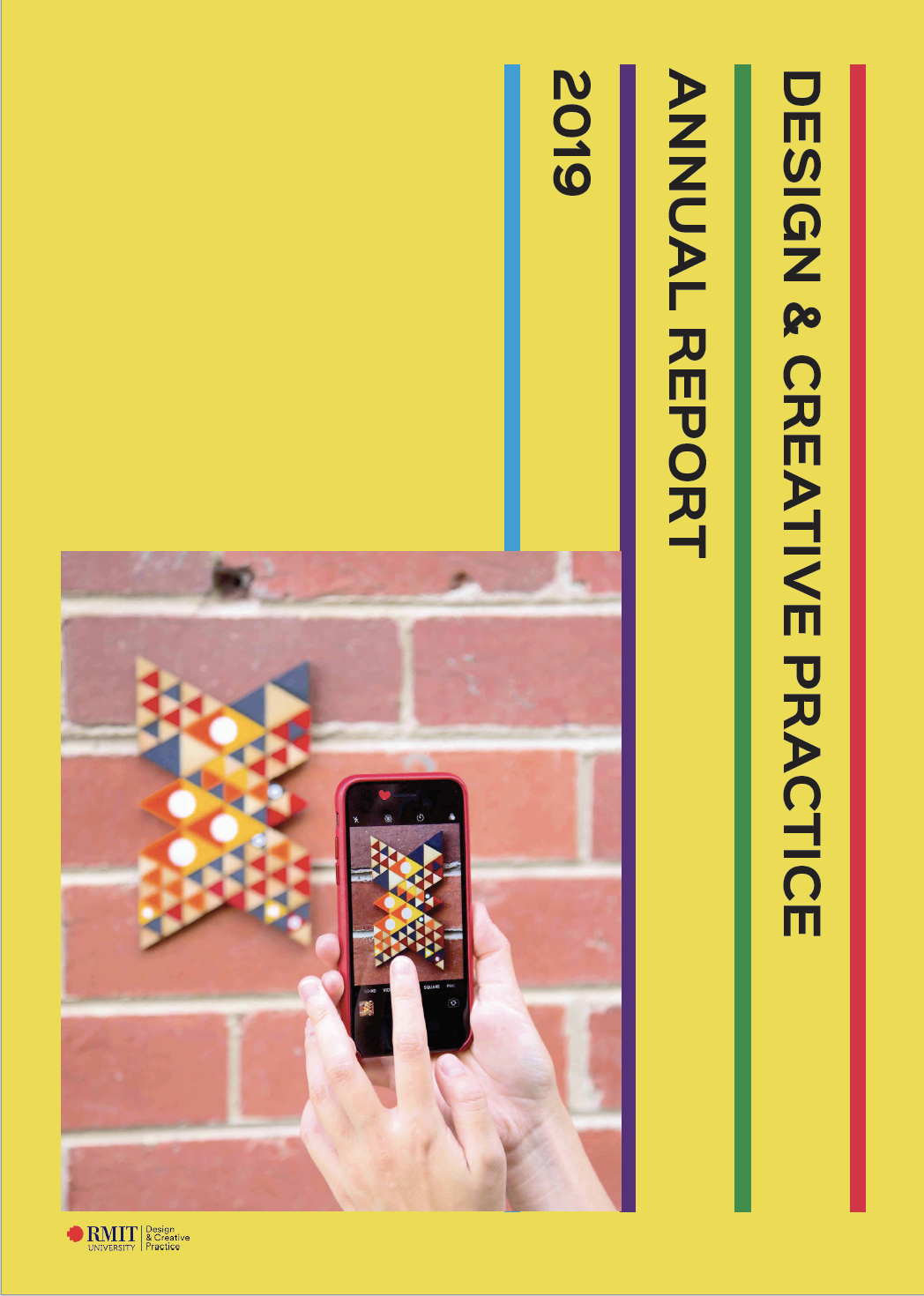
REPORT FORWARD:
2019 has seen the platform coalesce many of our key priority areas through networks and initiatives. These areas include creative interventions around social and health issues; urban play; mapping the value of creativity and creatives in future workforces; new models and methods for understandings social impact.
Our interdisciplinary networks further facilitate and enable our unique expertise — ensuring we take our research to the next level. These include: Wearables & Sensing Network; Contemporary Indigenous Architecture and Placemaking Network; Cultural Value & Impact Network (CVIN); Designing for Social Innovation Network; Design for Social Impact; Health, Arts, Social sciences & Humanities (HASH) Network.
So too, we have many exciting initiatives that seek to build, strengthen, and coalesce our interdisciplinary collaboration. The Impact Observatory is the DCP go to for all projects and activities relating to Design & Creative practice. The portal has two roles — one outward-facing to showcase all the fantastic research to industry, the other private-facing around collecting, curating and supporting research on its translational journey to impact. As we move towards the Engagement and Impact Agenda it is key for us to develop the support mechanisms for translational research.
We continued the highly successful Design Challenge. Last year we partnered with Telstra Digital Health to explore Ageing Well. The winning entry, CatPin has gone on to win awards and prizes. This year we collaborated with City of Melbourne on co-designing inclusive, civic and sensorial moments in the city. The challenge asked teams to consider what does the city feel like, smell like, sound like. Is it different for children? Older adults? How do we co-design a city for neurodiversity? Or cultural and linguistic diversity? And how does this co-design reflect the unique experience of Melbourne?
We have run a series of workshops and events to engage different communities and partners including hosting the Melbourne Ageing Research Collaboration (MARC) annual conference (responding to The Royal Commission into Aged Care), workshops at RMIT Europe (such as the Cities as Playground event) and Urban Play symposium. We have also hosted many global experts at RMIT — such as Professor Colleen Macklin, Associate Professor Anne Galloway, Professor Maren Hartmann, Professor Helen Kennedy — to run postgraduate and early career researcher workshops on games for change, systems thinking, visualisation techniques, more-than-human research, and homelessness. We have had a few key achievements such as the two ARC DECRAs in creative practice as well as the 2020 CreaTures grant (Jaz Choi) exploring the power of creative practice to intervene in the social.
All of these collaborations highlight the commitment of RMIT staff and students to co-designing for social and digital innovation and inclusion. A special thanks goes to the Distributed Leaders Group (DLG) — Dr Julienne van Loon, Prof Daniel Palmer, Dr Jaz Choi, Prof Esther Charlesworth and Prof Renata Kokánovic. Also big thanks to the ever wonderful Adelina Onicas and Esther Pierini. Thanks to our engaged Executive group and to also our industry SERAG advisory board members — Michael Hudson (Creative Vic); Kaye Glamuzina (City of Melb); Seb Chan (ACMI); Emma Crimmings (Artbank); Zara Stanhope (GoMA); Simone Le Amon (NGV); (Chair) Professor Natalie King (VCA).
We thank you for your ongoing support and collaboration.
Larissa Hjorth DCP director
If you would like to get involved with this project, fill out the form below or reach out to project leaders via the contact info provided alongside each bio.
People
Larissa Hjorth
Distinguished Professor and Director, Design and Creative Practice
School: Enabling Capability Platforms
Larissa Hjorth is a digital ethnographer, artist, Distinguished Professor and director of the Design & Creative Practice ECP platform at RMIT University. With Professor Heather Horst, she co-founded the Digital Ethnography Research Centre (DERC). Previously, Hjorth was Deputy Dean, Research & Innovation, in the School of Media & Communication (2013−2016). Hjorth served on the inaugural Australian Research Council (ARC) Engagement & Impact Pilot study assessment panel for humanities and creative practice.
Hjorth studies the socio-cultural dimensions of mobile media and play practices in the Asia-Pacific region with an emphasis on interdisciplinary, collaborative and cross-cultural approaches. She has published a dozen co-authored books, edited over a dozen Handbooks/Companions and has over 40 journal articles.
More recently, Hjorth’s work has become concerned with how we can bring creative, social and design solutions to the growing ageing populations and, in turn, how we might consider scenarios of what it means to die well. She is also studying how our “more-than-human” companions can teach us about new media in everyday life. Hjorth’s last book, Haunting Hands (Oxford Uni Press) looked at how mobile media is being deployed in situations of grief and trauma, her previous book explored how art practice can teach us new acumen into the climate change debate.
Hjorth’s books include Haunting Hands (with Cumiskey 2017), Screen Ecologies (with Pink, Sharp & Williams 2016), Digital Ethnography (Pink et al. 2016) Mobile Media in the Asia-Pacific (2009), Games & Gaming (2010), Online@AsiaPacific (with Arnold 2013), Understanding Social Media (with Hinton 2013), and Gaming in Locative, Social and Mobile Media (with Richardson 2014).
COHEALTH@365: PAST, PRESENT AND CO-FUTURES
February 2019
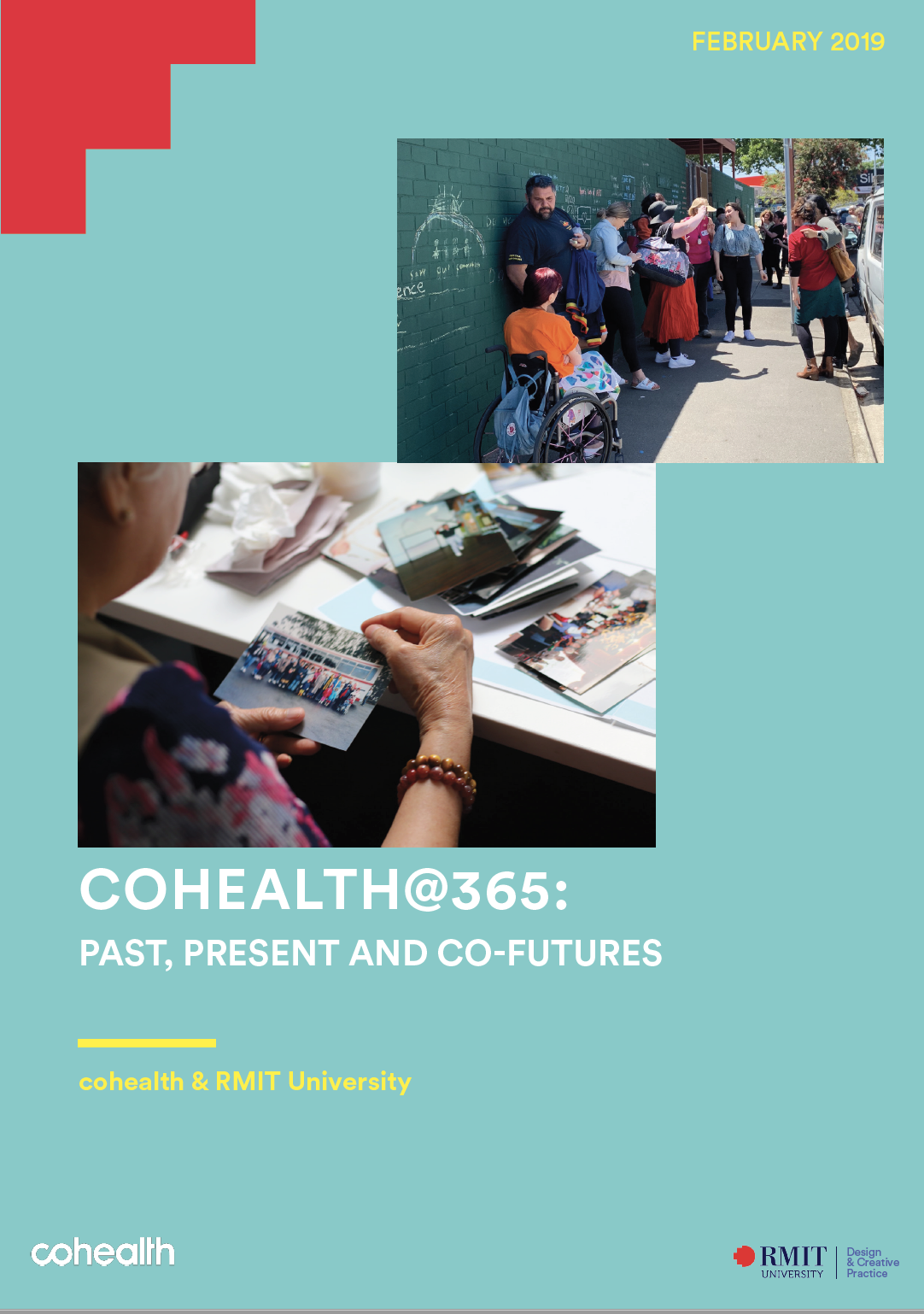
Gretchen Coombs, Adelina Onicas, Julienne Van Loon, Larissa Hjorth, Hugh Davies, William Balmford, Son Vivienne, Jaz Hee-jeong Choi
Summary
The cohealth@365: past, present & co-futures report details how we co-created and co-designed with the cohealth community to capture their stories and hear their voices as core to cohealth’s past, present and future. These stories help to locate the community as central to cohealth’s transition to cohealth@365.
The research that informs this report reveals how important cohealth has been to the diverse communities it serves. Over three months, the interdisciplinary team staged a series of encounters to engage the with the community and help us understand cohealth’s importance in their lives. These activities included deploying multisensorial design, ethnography and creative activities to acknowledge the diversity of embodied experiences around places, people and material cultures. We engaged with cohealth’s multiple stakeholders including clients, staff, bi-cultural workers and the general community (Collingwood area).
If you would like to get involved with this project, fill out the form below or reach out to project leaders via the contact info provided alongside each bio.
People
Larissa Hjorth
Distinguished Professor and Director, Design and Creative Practice
School: Enabling Capability Platforms
Larissa Hjorth is a digital ethnographer, artist, Distinguished Professor and director of the Design & Creative Practice ECP platform at RMIT University. With Professor Heather Horst, she co-founded the Digital Ethnography Research Centre (DERC). Previously, Hjorth was Deputy Dean, Research & Innovation, in the School of Media & Communication (2013−2016). Hjorth served on the inaugural Australian Research Council (ARC) Engagement & Impact Pilot study assessment panel for humanities and creative practice.
Hjorth studies the socio-cultural dimensions of mobile media and play practices in the Asia-Pacific region with an emphasis on interdisciplinary, collaborative and cross-cultural approaches. She has published a dozen co-authored books, edited over a dozen Handbooks/Companions and has over 40 journal articles.
More recently, Hjorth’s work has become concerned with how we can bring creative, social and design solutions to the growing ageing populations and, in turn, how we might consider scenarios of what it means to die well. She is also studying how our “more-than-human” companions can teach us about new media in everyday life. Hjorth’s last book, Haunting Hands (Oxford Uni Press) looked at how mobile media is being deployed in situations of grief and trauma, her previous book explored how art practice can teach us new acumen into the climate change debate.
Hjorth’s books include Haunting Hands (with Cumiskey 2017), Screen Ecologies (with Pink, Sharp & Williams 2016), Digital Ethnography (Pink et al. 2016) Mobile Media in the Asia-Pacific (2009), Games & Gaming (2010), Online@AsiaPacific (with Arnold 2013), Understanding Social Media (with Hinton 2013), and Gaming in Locative, Social and Mobile Media (with Richardson 2014).
ACMI Pilot Study (Phase 2 Report): The Future of Museum Engagement, Data and Older Audiences
October 2019
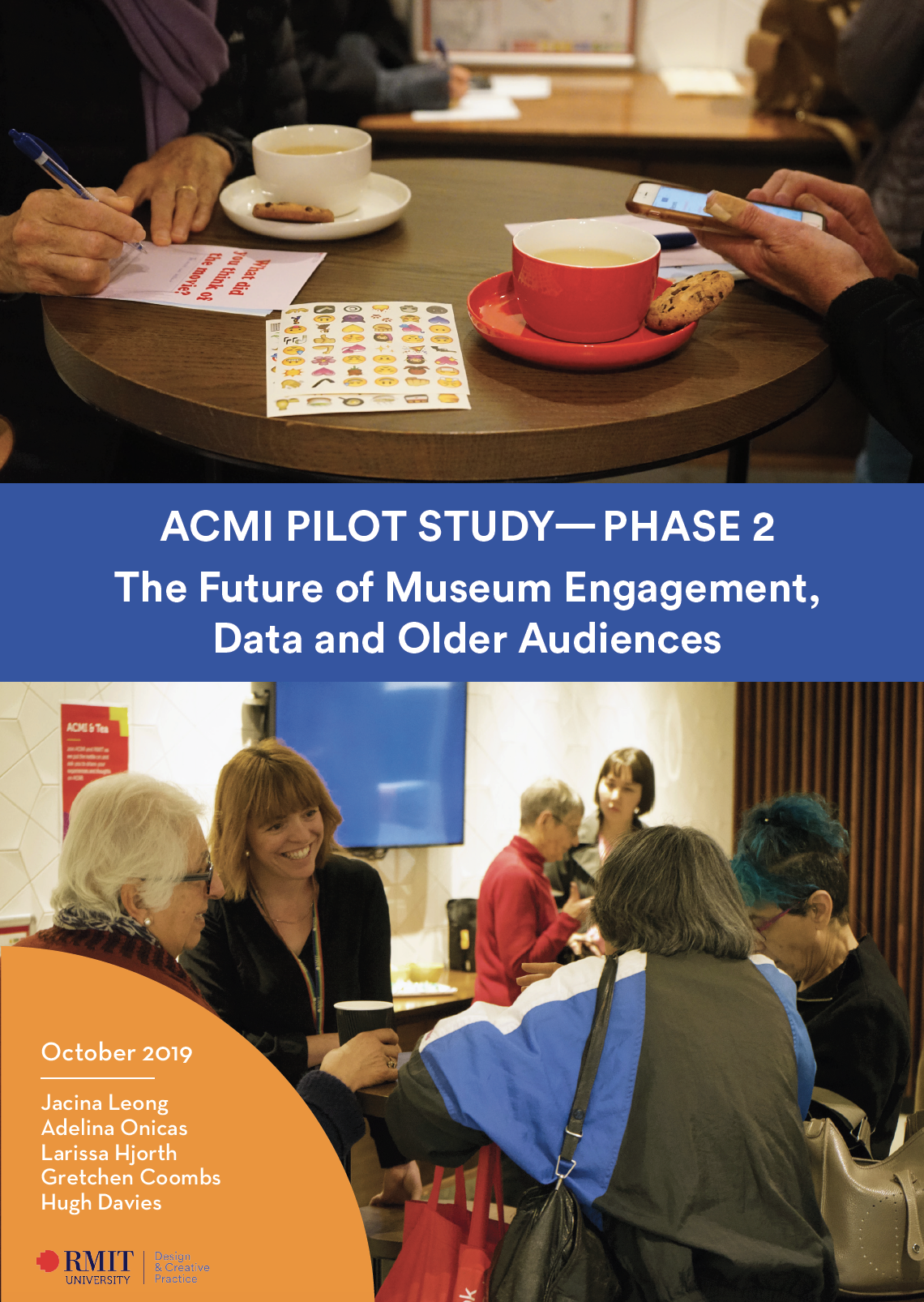
Jacina Leong, Adelina Onicas, Larissa Hjorth, Gretchen Coombs, Hugh Davies
Summary
Over two weekends in September 2019, the RMIT ACMI Tea project invited matinee cinema audiences to share a cup of tea and a biscuit, and discuss their associations, connections and sense of belonging with ACMI. Across a variety of cultures, tea is understood as core to conversation and connection. Through this project, and building on Phase 1, we specifically sought to identify and develop socially- thick understandings of the (digital and non-digital) experiences and potential opportunities for older adults to engage with ACMI on its reopening.
If you would like to get involved with this project, fill out the form below or reach out to project leaders via the contact info provided alongside each bio.
People
Larissa Hjorth
Distinguished Professor and Director, Design and Creative Practice
School: Enabling Capability Platforms
Larissa Hjorth is a digital ethnographer, artist, Distinguished Professor and director of the Design & Creative Practice ECP platform at RMIT University. With Professor Heather Horst, she co-founded the Digital Ethnography Research Centre (DERC). Previously, Hjorth was Deputy Dean, Research & Innovation, in the School of Media & Communication (2013−2016). Hjorth served on the inaugural Australian Research Council (ARC) Engagement & Impact Pilot study assessment panel for humanities and creative practice.
Hjorth studies the socio-cultural dimensions of mobile media and play practices in the Asia-Pacific region with an emphasis on interdisciplinary, collaborative and cross-cultural approaches. She has published a dozen co-authored books, edited over a dozen Handbooks/Companions and has over 40 journal articles.
More recently, Hjorth’s work has become concerned with how we can bring creative, social and design solutions to the growing ageing populations and, in turn, how we might consider scenarios of what it means to die well. She is also studying how our “more-than-human” companions can teach us about new media in everyday life. Hjorth’s last book, Haunting Hands (Oxford Uni Press) looked at how mobile media is being deployed in situations of grief and trauma, her previous book explored how art practice can teach us new acumen into the climate change debate.
Hjorth’s books include Haunting Hands (with Cumiskey 2017), Screen Ecologies (with Pink, Sharp & Williams 2016), Digital Ethnography (Pink et al. 2016) Mobile Media in the Asia-Pacific (2009), Games & Gaming (2010), Online@AsiaPacific (with Arnold 2013), Understanding Social Media (with Hinton 2013), and Gaming in Locative, Social and Mobile Media (with Richardson 2014).
Hugh Davies
Postdoctoral Research Fellow
School: Games
Hugh Davies is an artist, curator and researcher of games and play. His practice explores histories of media devices and cultures of games in the Asia Pacific Region. Awarded a PhD in Art, Design and Architecture from Monash University in 2014, Hugh’s studies in game cultures have been supported with fellowships from Tokyo Art and Space, M+ Museum of Visual Culture and the Hong Kong Design Trust. Hugh is currently a postdoctoral research fellow at RMIT in Melbourne, Australia.
Jacina Leong
PhD candidate
School: Media and Communication
Jacina Leong is an artist-curator and PhD candidate in the School of Media and Communications, RMIT. Her research explores critical-creative and careful curatorial approaches to social innovation practices by museums and galleries.
Over the past decade, she has worked in hybrid new media spaces, universities, national and international festivals, regional museums and galleries, libraries and schools — to vision and deliver a diverse range of trans-disciplinary engagement programs, via highly collaborative, experimental and site-responsive processes. Most recently, Jacina was curator for Robotronica, project lead and founding member of the Guerrilla Knowledge Unit, guest facilitator of the Future Innovators Summit (Ars Electronica Tokyo Initiative), and co-curator of the provocation, Curating In The Age of Automation (RMIT & Ritsumeikan University, Kyoto).
From 2012 to 2017, Jacina worked at The Cube (QUT), establishing the inaugural STEAM engagement program for school and university students, educators and pre-service teachers. This program involved key collaborations with local, national and international organisations including Ars Electronica, LEGO Education, and Brisbane City Council. She has also worked in public program development at the Ipswich Art Gallery, collaborative learning strategy in universities, gallery management at Jan Murphy Gallery, and was advisor to the inaugural Make Nice at VIVID Festival.
LOCATING THE MOBILE
December 2019
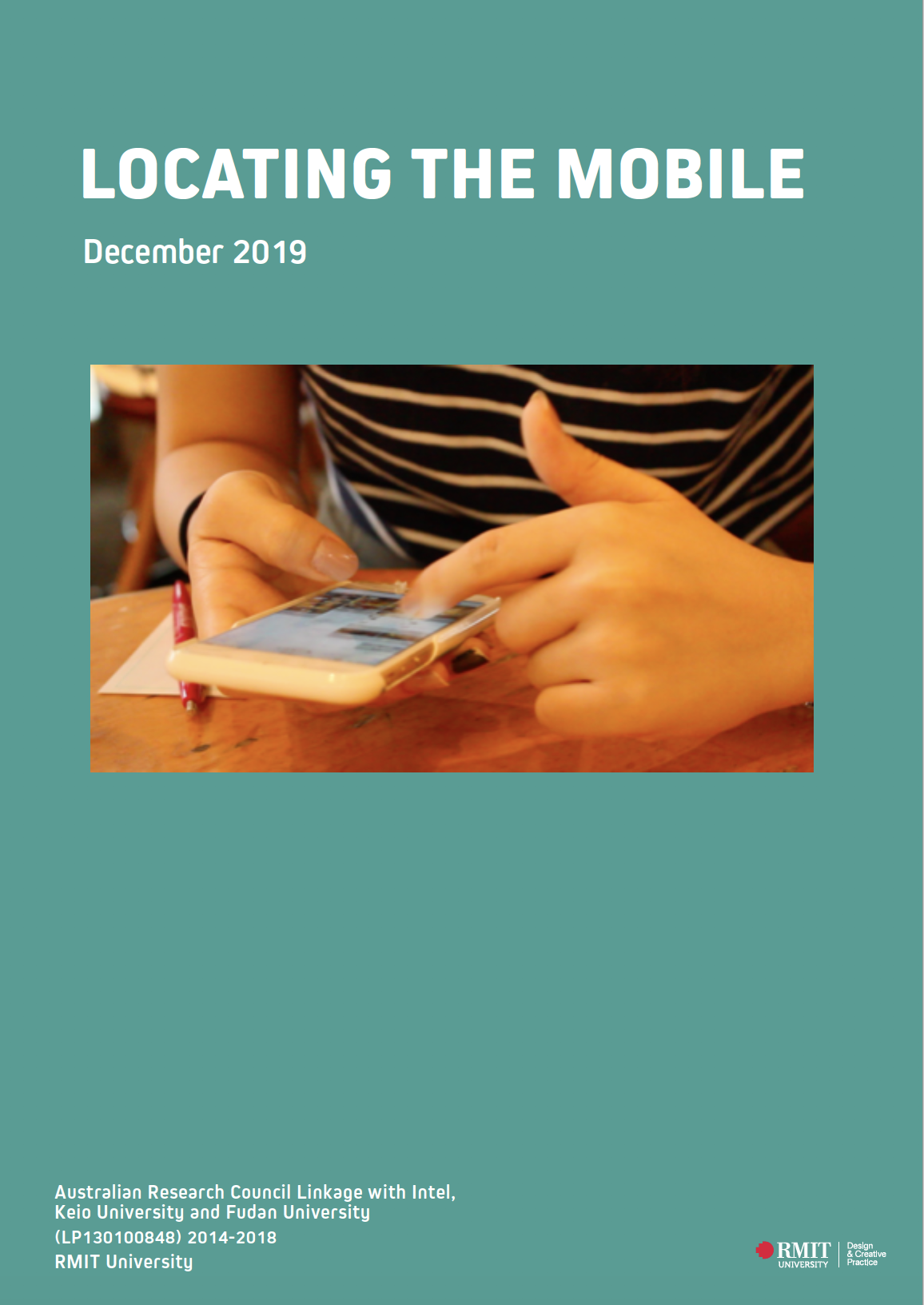
Larissa Hjorth, Kana Ohashi, Jolynna Sinanan, Heather Horst, Sarah Pink, Fumitoshi Kato, Baohua Zhou and Genevieve Bell.
Summary
This Australian Research Council Linkage with Intel, Locating the Mobile, followed ethnographically 12 households over three years (2014 – 17) within the three purposefully very distinct locations (Melbourne, Tokyo and Shanghai) to gain a sense of cultural differences and similarities with respect to intergenerational use of locative media.
To understand how locative media fit into the rhythms of everyday life — with its mundane routines and intimacies — the researchers went beyond standard interviewing methods. Instead, they developed ethnographic techniques that enabled them to engage empathetically with people’s intimate experiences in mundane life.
Suggested Citation
Hjorth, L., Ohashi, K., Sinanan, J., Horst, H., Pink, S., Kato, F., Zhou, B., and Bell, G., 2019. Locating the Mobile: Australian Research Council Report. RMIT University, Melbourne.
If you would like to get involved with this project, fill out the form below or reach out to project leaders via the contact info provided alongside each bio.
People
Larissa Hjorth
Distinguished Professor and Director, Design and Creative Practice
School: Enabling Capability Platforms
Larissa Hjorth is a digital ethnographer, artist, Distinguished Professor and director of the Design & Creative Practice ECP platform at RMIT University. With Professor Heather Horst, she co-founded the Digital Ethnography Research Centre (DERC). Previously, Hjorth was Deputy Dean, Research & Innovation, in the School of Media & Communication (2013−2016). Hjorth served on the inaugural Australian Research Council (ARC) Engagement & Impact Pilot study assessment panel for humanities and creative practice.
Hjorth studies the socio-cultural dimensions of mobile media and play practices in the Asia-Pacific region with an emphasis on interdisciplinary, collaborative and cross-cultural approaches. She has published a dozen co-authored books, edited over a dozen Handbooks/Companions and has over 40 journal articles.
More recently, Hjorth’s work has become concerned with how we can bring creative, social and design solutions to the growing ageing populations and, in turn, how we might consider scenarios of what it means to die well. She is also studying how our “more-than-human” companions can teach us about new media in everyday life. Hjorth’s last book, Haunting Hands (Oxford Uni Press) looked at how mobile media is being deployed in situations of grief and trauma, her previous book explored how art practice can teach us new acumen into the climate change debate.
Hjorth’s books include Haunting Hands (with Cumiskey 2017), Screen Ecologies (with Pink, Sharp & Williams 2016), Digital Ethnography (Pink et al. 2016) Mobile Media in the Asia-Pacific (2009), Games & Gaming (2010), Online@AsiaPacific (with Arnold 2013), Understanding Social Media (with Hinton 2013), and Gaming in Locative, Social and Mobile Media (with Richardson 2014).
Innovative Methods to Understand Impact in Creative Practices: A Short Survey
March 2019
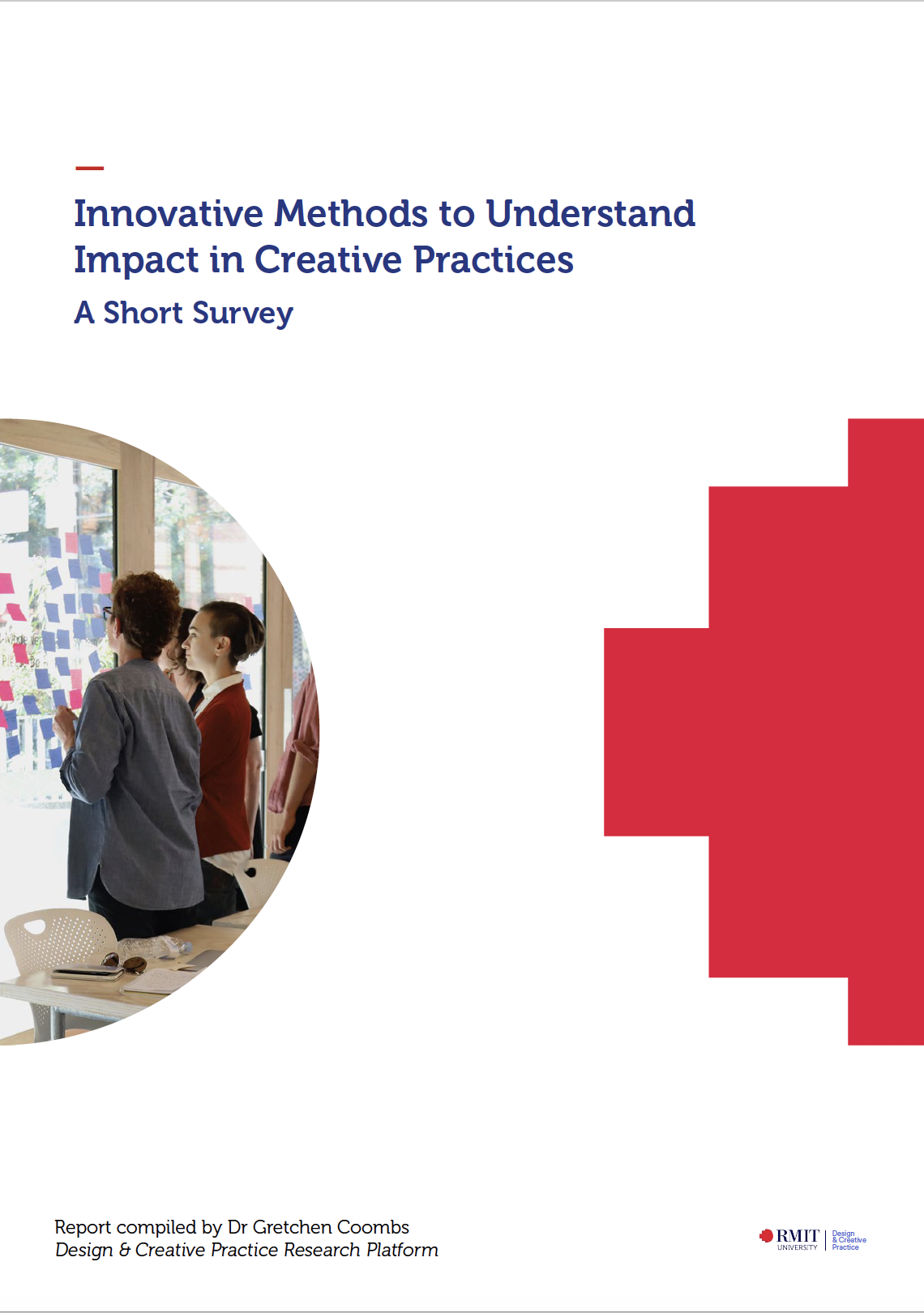
Report compiled by Dr Gretchen Coombs
Summary
Creative practitioners are increasingly asked to demonstrate impact of their work, which has led to challenges to understand the complexity of artistic practice and its cultural value. How can we trace impact, and if there is impact, for whom — the creative practitioner, the community, the museum, all of the above? What is the benchmark for success — symbolic shift, demonstrable policy changes, increased funding, more industry partnerships? These questions need to respond to national assessment systems like the Australian Research Council (ARC) Engagement and Impact and the UK’s Research Evaluation Framework (REF). How can creative practices offer innovative methods as tools for tracking impact?
Creative practices’ value has traditionally been the intrinsic and indeterminate yet in recent years has been measured by its instrumental, or economic value. In light of more socially-engaged practices and the “turn towards community,” value takes on a more diffuse meaning. More often than not, the goal is social change, and this involves groups of community stakeholders who are consulted and become invested in the process and outcomes of the art project, and ultimately need to contribute to understanding its impact. Within this process, more and more non-art agencies and government departments — such as health and urban renewal (i.e., placemaking) — are seeking out socially-engaged projects. These shifts reinforce and broaden the scope of instrumentalisation in the arts based on its social use, and therefore compound the complexity of impact assessment because of the number of stakeholders who may or may not have differing definitions of success and impact.
If you would like to get involved with this project, fill out the form below or reach out to project leaders via the contact info provided alongside each bio.
People
Gretchen Coombs
Post Doctoral Research Fellow
School: Design and Creative Practice
Gretchen Coombs is a Post Doctoral Research Fellow in the Design & Creative Practice Enabling Capability Platform at RMIT. She researches socially engaged art practices in the US, the UK and Australia, with a particular focus on how they are practiced in urban contexts. She’s a core member of the Cultural Value and Impact Network (CVIN) and contributes to Creative Care in the School of Art. Gretchen has a PhD in social and cultural anthropology and a MA in visual criticism: her writing uses a combination of ethnographic methods and visual analysis. She is a co-author of Creative Practice Ethnographies (Rowan & Littlefield 2019) and her monograph, The Lure of the Social: Encounters with Contemporary Artists (Intellect 2021 ) is an experimental ethnography about contemporary artists working at the intersection of art, aesthetics, and politics.
Mapping RMIT capabilities in Design for Social Innovation: A Conceptual Paper
November 2019

Project Lead: Professor Laurene Vaughan
Research Officer: Caroline Francis
Summary
This conceptual paper navigates the surrounding facets of Design for Social Innovation within the context of literature, the expertise, perspectives and activities within RMIT. Also considered here are the external competitors with potential learnings and partnering opportunities, the placed parameters required for the success of a Design for Social Innovation network, opportunities in social issues and identified funding sources, and finally outreach openings to existing RMIT branches beyond Australia to leverage networks in Vietnam and Barcelona.
Worldwide we face unprecedented challenges whilst simultaneously being presented with previously unimaginable opportunities. These challenges and opportunities are social, cultural, technological and environmental. They are complex and beyond the domain of any
one discipline expertise. To address these, there is a greater need for researchers to collaboratively contribute on designs for social innovation that are effective in navigating our future by tackling issues of sustainability, health, technology, and social exclusion of vulnerable people. This research, maps and profiles the internal RMIT capabilities and expertise in the field of design for social innovation (DSI). Identified competitors and partners are reviewed for furthering RMIT’s strengths, synergies and research opportunities. Overall, aiming to validate the proposed DSI Network for meaningful and collaborative connections.
Suggested Citation
Vaughan, L., Francis, C. (2019). Mapping RMIT Capabilities in Design for Social Innovation – A conceptual paper. Melbourne: RMIT University.
If you would like to get involved with this project, fill out the form below or reach out to project leaders via the contact info provided alongside each bio.
People
Laurene Vaughan
Professor and Dean
School: School of Design
Professor Laurene Vaughan is Dean of the School of Design at RMIT. She is internationally recognised as a leader in interdisciplinary and applied design research and pedagogy. Professor Laurene Vaughan has a diverse research and teaching practice covering the areas of design, communication, fashion and embedded research in diverse industry sectors. Laurene currently also contributes to the University research community through being a Research Leader in the RMIT Design Research Institute.
GAMES OF BEING MOBILE
November 2019
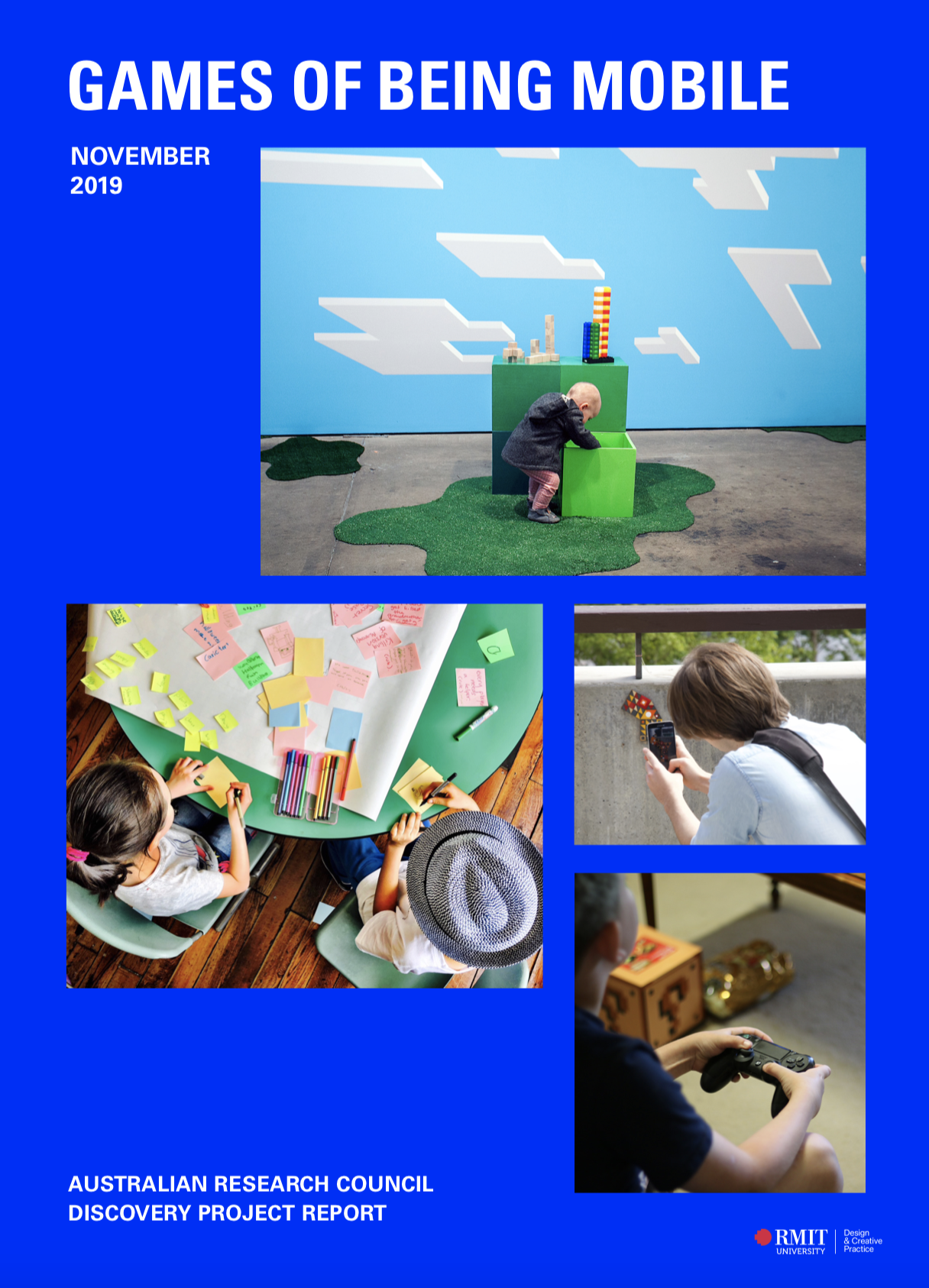
Larissa Hjorth, Ingrid Richardson, Hugh Davies, William Balmford
Summary
The Games of Being Mobile project followed nearly sixty households over three years (2013 – 2016) in five of Australia’s capital cities: Melbourne, Perth, Adelaide, Sydney and Brisbane. It is the first national survey of mobile games. Our ethnographic project sought to put mobile games in context: socially, intergenerationally and culturally. Using ethnography allowed us deep insights into motivations, practices and perceptions.
Suggested Citation
Hjorth, L., Richardson, I., Davies, H., Balmford, W. (2019). Games of Being Mobile Report. Melbourne: RMIT University.
If you would like to get involved with this project, fill out the form below or reach out to project leaders via the contact info provided alongside each bio.
People
Larissa Hjorth
Distinguished Professor and Director, Design and Creative Practice
School: Enabling Capability Platforms
Larissa Hjorth is a digital ethnographer, artist, Distinguished Professor and director of the Design & Creative Practice ECP platform at RMIT University. With Professor Heather Horst, she co-founded the Digital Ethnography Research Centre (DERC). Previously, Hjorth was Deputy Dean, Research & Innovation, in the School of Media & Communication (2013−2016). Hjorth served on the inaugural Australian Research Council (ARC) Engagement & Impact Pilot study assessment panel for humanities and creative practice.
Hjorth studies the socio-cultural dimensions of mobile media and play practices in the Asia-Pacific region with an emphasis on interdisciplinary, collaborative and cross-cultural approaches. She has published a dozen co-authored books, edited over a dozen Handbooks/Companions and has over 40 journal articles.
More recently, Hjorth’s work has become concerned with how we can bring creative, social and design solutions to the growing ageing populations and, in turn, how we might consider scenarios of what it means to die well. She is also studying how our “more-than-human” companions can teach us about new media in everyday life. Hjorth’s last book, Haunting Hands (Oxford Uni Press) looked at how mobile media is being deployed in situations of grief and trauma, her previous book explored how art practice can teach us new acumen into the climate change debate.
Hjorth’s books include Haunting Hands (with Cumiskey 2017), Screen Ecologies (with Pink, Sharp & Williams 2016), Digital Ethnography (Pink et al. 2016) Mobile Media in the Asia-Pacific (2009), Games & Gaming (2010), Online@AsiaPacific (with Arnold 2013), Understanding Social Media (with Hinton 2013), and Gaming in Locative, Social and Mobile Media (with Richardson 2014).
Hugh Davies
Postdoctoral Research Fellow
School: Games
Hugh Davies is an artist, curator and researcher of games and play. His practice explores histories of media devices and cultures of games in the Asia Pacific Region. Awarded a PhD in Art, Design and Architecture from Monash University in 2014, Hugh’s studies in game cultures have been supported with fellowships from Tokyo Art and Space, M+ Museum of Visual Culture and the Hong Kong Design Trust. Hugh is currently a postdoctoral research fellow at RMIT in Melbourne, Australia.
Ingrid Richardson
Professor
School: Media and Communication
Professor Ingrid Richardson has been teaching, supervising and researching in the fields of digital media, mobile media and games for over twenty years. She has a broad interest in the human-technology relation and has published widely on the phenomenology of games and mobile media, digital ethnography and innovative research methods, the relation between technology use and wellbeing, and the cultural effects of urban screens, wearable technologies, virtual and augmented reality, remix culture and web-based content creation and distribution. Ingrid has led or co-led 14 funded research projects, the most recent being an ARC DP [Games of Being Mobile] with Larissa Hjorth. She is contributing co-editor of Studying Mobile Media (Routledge, 2011) and co-author of Gaming in Social, Locative and Mobile Media (Palgrave, 2014), Ambient Play (MIT, 2020), Understanding Games and Game Cultures (Sage, 2020), Exploring Minecraft: Ethnographies of Play and Creativity (Palgrave, forthcoming), and Mobile Media and the Urban Night (Palgrave, forthcoming). Ingrid brings ten years’ experience in university-level HDR management and during this time has actively championed and supported creative methods and practice-led postgraduate research. Over the past five years she has also developed a passion for teaching critical web literacy skills to undergraduate students across all disciplines.
2018 ↓↑
Annual Report 2018
Design & Creative Practice
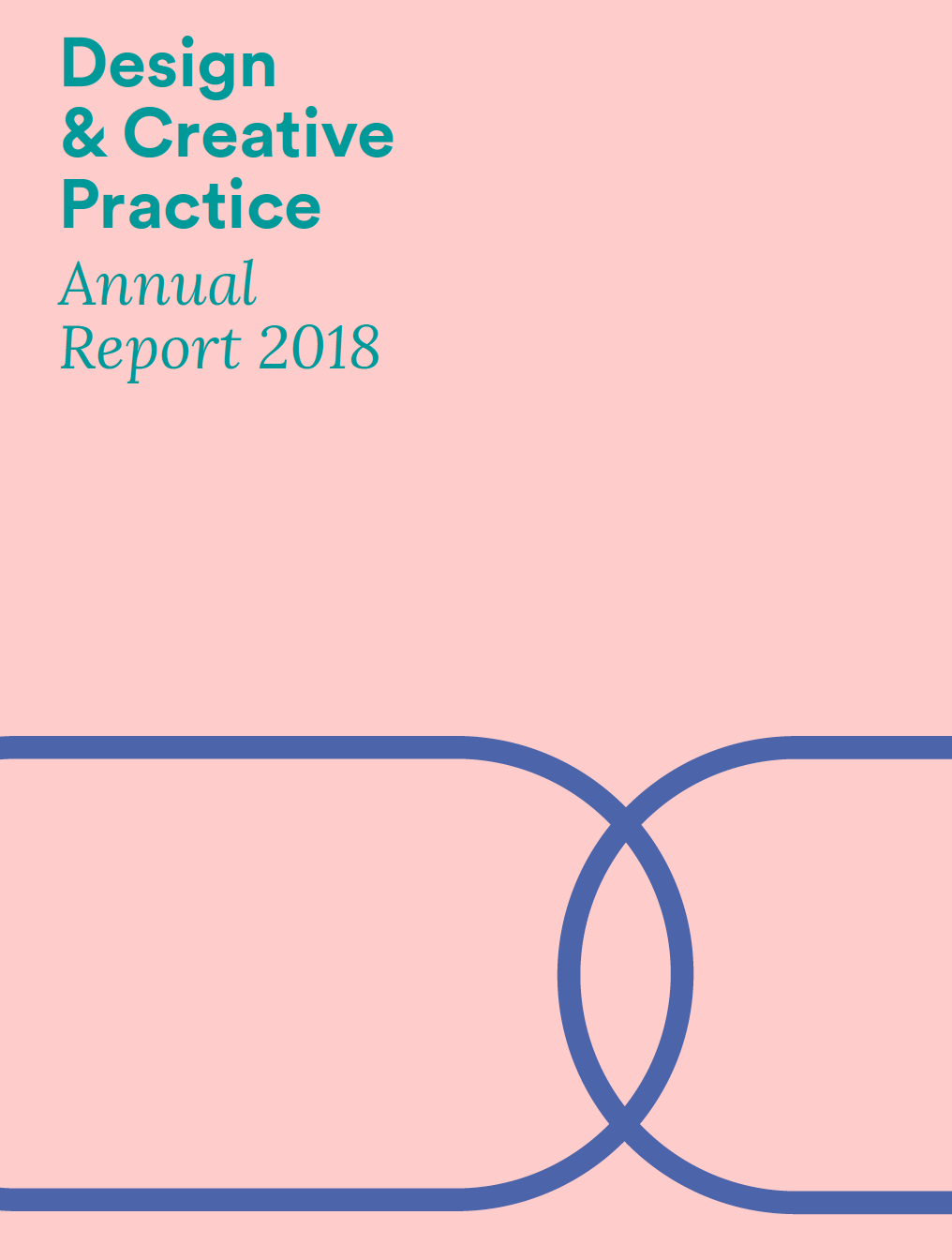
REPORT FORWARD:
2018 has been a busy and exciting year for building externally facing partnerships and collaboration — especially around digital health, technology and the community sector.
It began with the Engaging For Impact (EFI) 2018 conference in which we co-designed various workshops — including one with Telstra on the role of technology and Future of Care, another workshop on the social and creative dimensions of VR and AR with Oculus and yet another on One Good Death.
We have further fostered partnerships with key industry such as Telstra through a series of initiatives.
For example, we began what will be an annual initiative, a Design and Creative Practice Design Challenge. This year we collaborated with Telstra and RMIT Industry Engagement around the designing Digital Health solutions for Ageing Well.
We also launched the Impact Observatory — an online repository for all our CDF projects. The portal has two roles — one outward-facing to showcase all the fantastic research to industry, the other private-facing around collecting, curating and supporting research on its translational journey to impact. As we move towards the Engagement and Impact Agenda it is key for us to develop the support mechanisms for translational research.
We have begun development around designing for social futures through a series of initiatives internationally (in Japan and Spain). We collaborated with RMIT Europe around their Digital Health priority areas through a symposium and co-creative workshop. This collaboration fostered our new cross-platform (DCP, Social Change, and Biomedical and Health Innovation) partnership with the Melbourne Ageing Research Collaboration (MARC). In November we host a workshop with MARC on End of Life Care.
We also piloted a Distributed Leaders Group (DLG) as part of the collaborative ethos of the platform to ensure representation and agency across schools and disciplines. Our DLG consists of Dr Julienne van Loon, Prof Daniel Palmer, Dr Jaz Choi, Prof Esther Charlesworth and Prof Renata Kokanovic.
We thank you for your ongoing support and collaboration.
Larissa Hjorth
If you would like to get involved with this project, fill out the form below or reach out to project leaders via the contact info provided alongside each bio.
People
Larissa Hjorth
Distinguished Professor and Director, Design and Creative Practice
School: Enabling Capability Platforms
Larissa Hjorth is a digital ethnographer, artist, Distinguished Professor and director of the Design & Creative Practice ECP platform at RMIT University. With Professor Heather Horst, she co-founded the Digital Ethnography Research Centre (DERC). Previously, Hjorth was Deputy Dean, Research & Innovation, in the School of Media & Communication (2013−2016). Hjorth served on the inaugural Australian Research Council (ARC) Engagement & Impact Pilot study assessment panel for humanities and creative practice.
Hjorth studies the socio-cultural dimensions of mobile media and play practices in the Asia-Pacific region with an emphasis on interdisciplinary, collaborative and cross-cultural approaches. She has published a dozen co-authored books, edited over a dozen Handbooks/Companions and has over 40 journal articles.
More recently, Hjorth’s work has become concerned with how we can bring creative, social and design solutions to the growing ageing populations and, in turn, how we might consider scenarios of what it means to die well. She is also studying how our “more-than-human” companions can teach us about new media in everyday life. Hjorth’s last book, Haunting Hands (Oxford Uni Press) looked at how mobile media is being deployed in situations of grief and trauma, her previous book explored how art practice can teach us new acumen into the climate change debate.
Hjorth’s books include Haunting Hands (with Cumiskey 2017), Screen Ecologies (with Pink, Sharp & Williams 2016), Digital Ethnography (Pink et al. 2016) Mobile Media in the Asia-Pacific (2009), Games & Gaming (2010), Online@AsiaPacific (with Arnold 2013), Understanding Social Media (with Hinton 2013), and Gaming in Locative, Social and Mobile Media (with Richardson 2014).
2017 ↓↑
Annual Report 2017
Design & Creative Practice
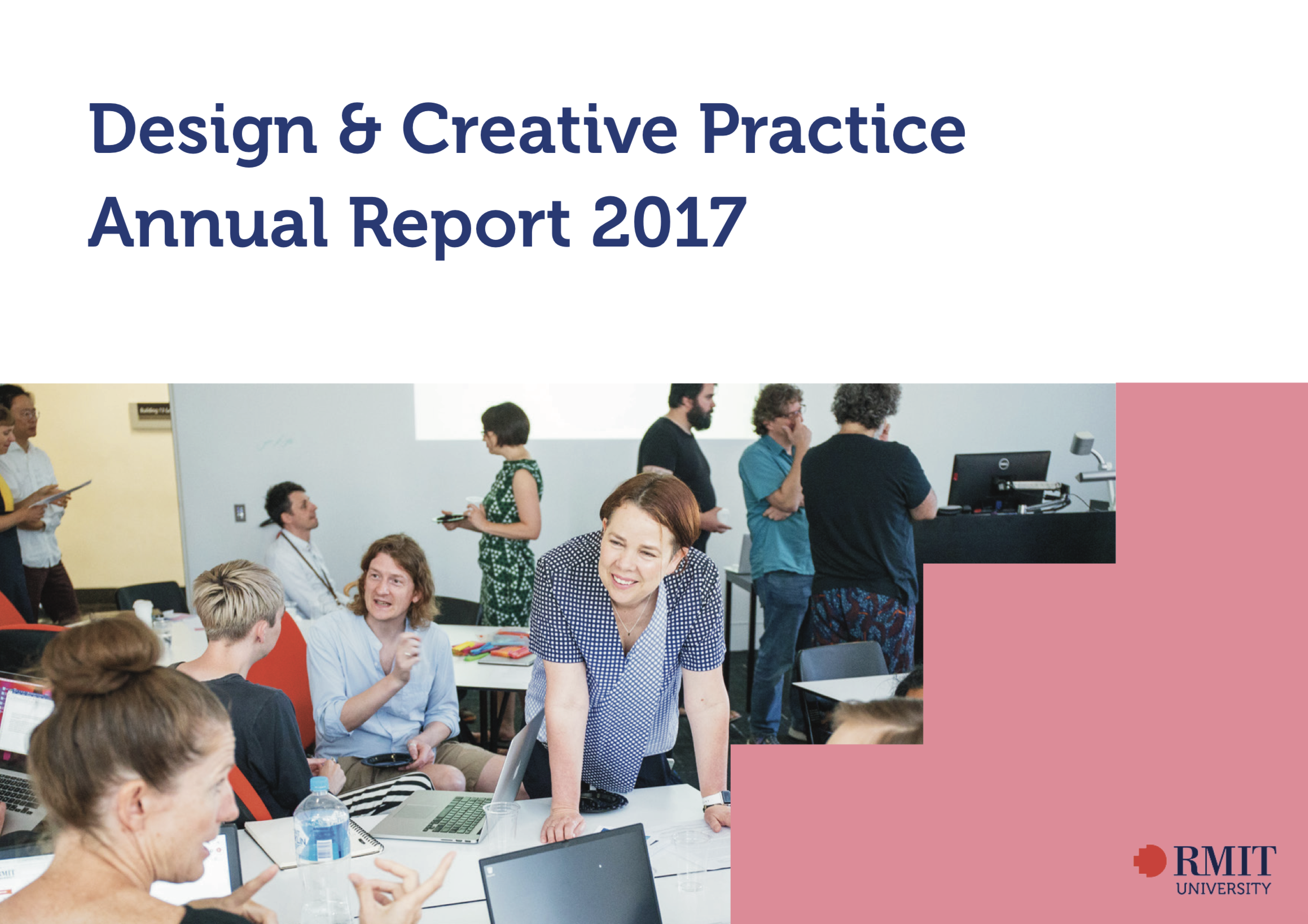
REPORT FORWARD:
Since taking up the role of Director of RMIT’s Design & Creative Practice ECP in February this year, the platform has evolved through a series of university-wide and industry consultations to ensure that key areas of expertise have been identified. This collaborative vision has been important to ensure DCP’s voice is diverse, inclusive and forward-looking.
Design & Creative Practice researchers are inventive, playful, explorative and progressive in their approach to real-world problems that lie at the intersection of digital design, sustainability and material innovation. Focused on critical, agile and interdisciplinary practice-based research, this platform is committed to advancing social and digital innovation, and creating alternative pathways for impact through collaboration.
During 2017 we have developed strategies to ensure that this key strength area for the university is supported towards taking our research into more impactful and applied contexts. Through aligning with the four priority areas, researchers have been able to tap into initiatives such as the Capability Development Fund (CDF) and ECP Opportunity Fund (EOF) to further develop research opportunities in these areas.
The DCP ECP has seen the roll out of many exciting initiatives including the Impact Observatory and the Creative Agency, as well as numerous networks such as the HEALTH network, Design for Wellbeing and Network for Social Practice in Art & Design, to name but a few. In December we host our inaugural meeting for the DCP Sector Advisory Board that will ensure we are industry engaged in everything we do. I would like to thank everyone that has supported the implementation of the DCP and look forward to working together on a future for the platform that highlights social practice, digital innovation, impactful translation and sustainability as core objectives.
Many thanks
Larissa Hjorth
DCP Director
If you would like to get involved with this project, fill out the form below or reach out to project leaders via the contact info provided alongside each bio.
People
Larissa Hjorth
Distinguished Professor and Director, Design and Creative Practice
School: Enabling Capability Platforms
Larissa Hjorth is a digital ethnographer, artist, Distinguished Professor and director of the Design & Creative Practice ECP platform at RMIT University. With Professor Heather Horst, she co-founded the Digital Ethnography Research Centre (DERC). Previously, Hjorth was Deputy Dean, Research & Innovation, in the School of Media & Communication (2013−2016). Hjorth served on the inaugural Australian Research Council (ARC) Engagement & Impact Pilot study assessment panel for humanities and creative practice.
Hjorth studies the socio-cultural dimensions of mobile media and play practices in the Asia-Pacific region with an emphasis on interdisciplinary, collaborative and cross-cultural approaches. She has published a dozen co-authored books, edited over a dozen Handbooks/Companions and has over 40 journal articles.
More recently, Hjorth’s work has become concerned with how we can bring creative, social and design solutions to the growing ageing populations and, in turn, how we might consider scenarios of what it means to die well. She is also studying how our “more-than-human” companions can teach us about new media in everyday life. Hjorth’s last book, Haunting Hands (Oxford Uni Press) looked at how mobile media is being deployed in situations of grief and trauma, her previous book explored how art practice can teach us new acumen into the climate change debate.
Hjorth’s books include Haunting Hands (with Cumiskey 2017), Screen Ecologies (with Pink, Sharp & Williams 2016), Digital Ethnography (Pink et al. 2016) Mobile Media in the Asia-Pacific (2009), Games & Gaming (2010), Online@AsiaPacific (with Arnold 2013), Understanding Social Media (with Hinton 2013), and Gaming in Locative, Social and Mobile Media (with Richardson 2014).
